Hadith must be interpreted according to the moral, legal, theological, and methodological principles of Islam. They cannot be acted upon at face-value according to one’s own personal understanding.
As for the problematic hadith in question, the abridged text is as follows:
Ibn Abbas reported: A blind man had a concubine who used to disparage and slander the Prophet (ṣ). The man forbade her and rebuked her, but she did not stop. One night she again slandered and disparaged the Prophet (ṣ), so he stabbed her in the stomach and killed her. The Prophet (ṣ) said:
أَلاَ اشْهَدُوا أَنَّ دَمَهَا هَدَرٌ
Bear witness there is no retaliation for her life.
Source: Sunan Abī Dāwūd 4361
Listen I am going to be listing the hanafi and kufieen view so nobody attack
This hadith is weak because it comes through a questionable chain of authority and it apparently contradicts well-established moral and legal principles in Islam. The implication some people have wrongly inferred from the narration – that an extrajudicial killing for blasphemy is permissible – is a serious mistake.
As for the chain of authorities, every version of the story originates with Uthman ibn Muslim al-Shuhham narrating from ‘Ikramah, may Allah have mercy on them. There are no other credible chains to support this story.
Uthman al-Shuhham was considered reliable by some scholars, but plenty of others criticized and rejected his narrations. He narrated very few hadith as compared to other narrators, whom he usually narrated from Muslim ibn Abi Bakrah, and even fewer hadith from ‘Ikramah. He is in no way an agreed upon narrator.
Al-Dhahabi writes:
قال يحيى القطان يعرف من حديثه وينكر وقال النسائي ليس بالقوى
Yahya al-Qattan said: His narrations are sometimes acknowledged or rejected. Al-Nasa’i said: He is not strong.
Source: Mīzān al-I’tidāl 3/60
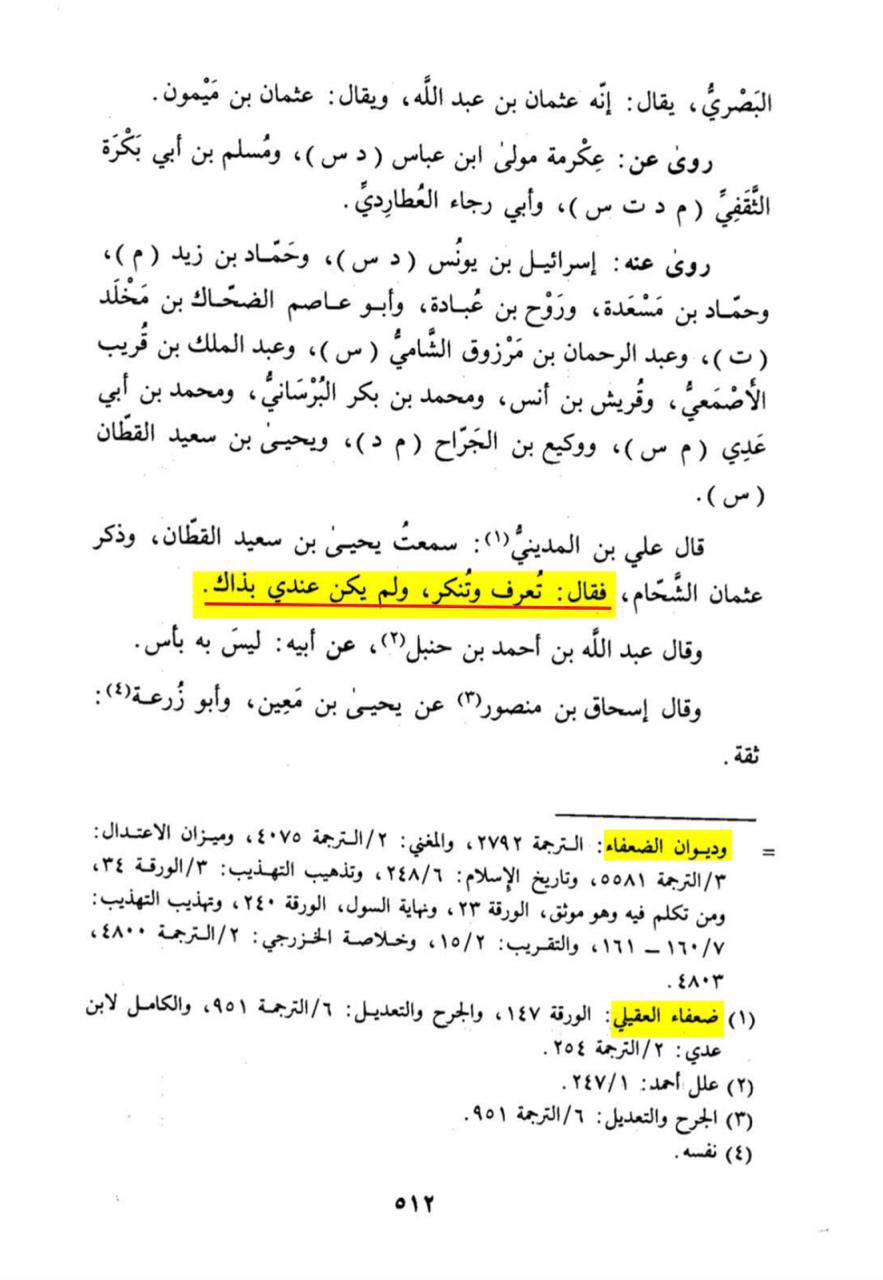

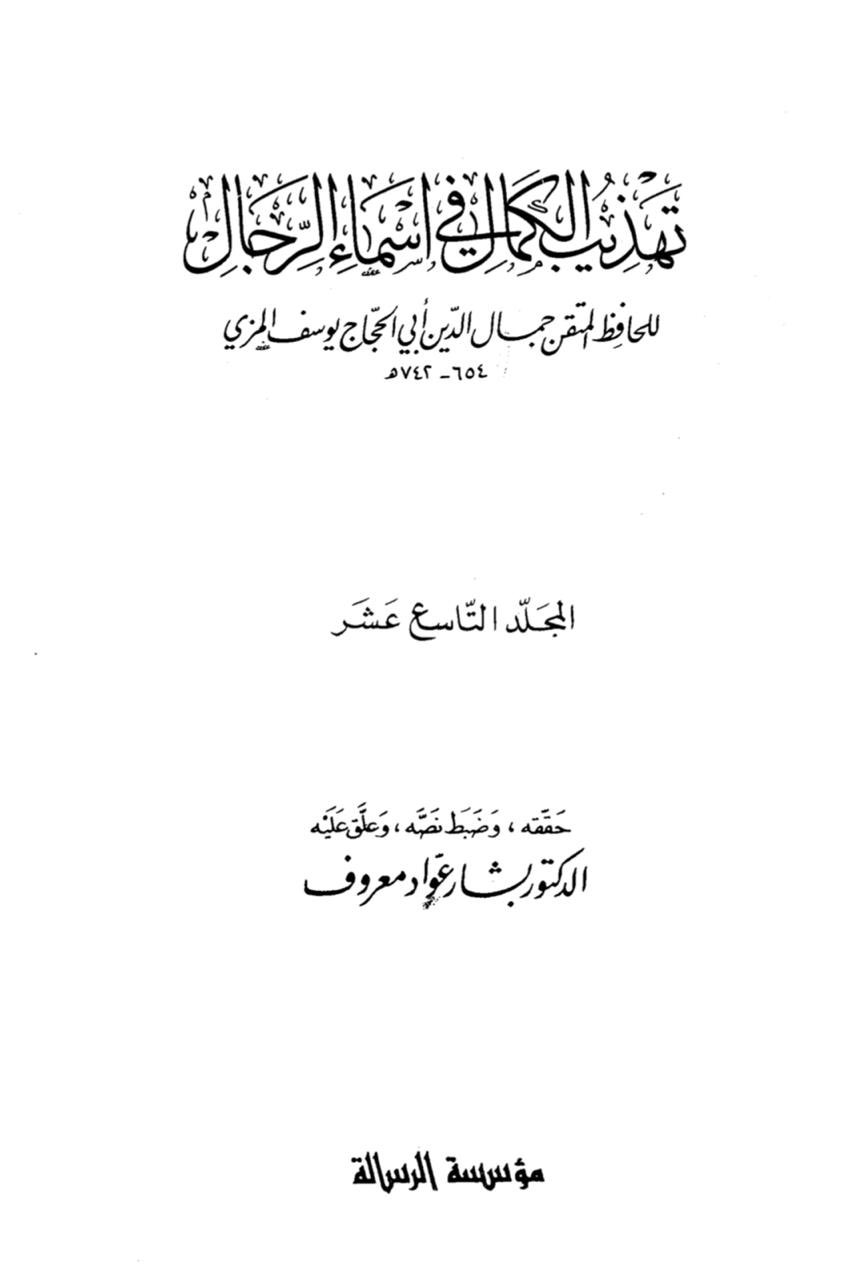 And Al-Mughaltay writes:
وقال أبو أحمد الحاكم عثمان بن مسلم أبو سلمة الشحام ليس بالمتين عندهم
Abu Ahmad al-Hakim said Uthman ibn Muslim, Abu Salamah, is not solid in their view.
Source: Ikmāl Tahdhīb al-Kamāl 9/194
And Ibn Hajar writes:
وكذا أبو أحمد وقال ليس بالمتين عندهم وقال الدارقطني بصري يعتبر به
Likewise was said by Abu Ahmad that he is not solid in their view. Al-Daraqutni said he is a Basran in need of further consideration.
Source: Tahdhīb al-Tahdhīb 7/161
And Al-Arna’ut writes:
وفي عثمان كلام ينزله عن رتبة الصحيح
There is a discussion on Uthman about lowering him from the level of soundness.
Source: Takhrīj al-Musnad 34/131
Ibn ‘Adi also mentioned him in his book of weak narrators, although he did not consider him weak per se, writing:
عُثْمَانُ الشَّحَّامُ لَيْسَ لَهُ كَثِيرُ حَدِيثٍ وَمَا رَأَى بِهِ بَأْسًا فِي رِوَايَاتِهِ
Uthman al-Shuhham does not have many traditions, but there is no objection seen in his narrations.
Source: al-Kāmil fī Ḍuʻafā’ al-Rijāl 6/293
However, just because Ibn ‘Adi saw nothing wrong in his narrations does not mean he considered him above scrutiny.
Imam Muslim included only one narration of Uthman al-Shuhham from Muslim ibn Abi Bakrah in his Sahih collection. This indicates that Imam Muslim considered his chain from Ibn Abi Bakrah to be authentic, but he did not narrate his chain from ‘Ikramah. Thus, the presence of Uthman al-Shuhham in the Sahih does not mean every narration from him was considered authentic by Imam Muslim.
Hence, the problematic hadith of the blind man is based on the authority of a questionable narrator, who narrated an unusually small number of hadith, who was criticized and rejected by some scholars, and whose narrations are otherwise not widely-regarded as legal evidence. On this basis alone, Muslims are not required at all to accept the authenticity of the story or the legal ruling it supports.
If, for the sake of argument, Uthman al-Shuhham’s chain from ‘Ikramah is sound and the story is true, there are certainly missing details from the text that are needed to properly contextualize it. An anomalous (shadh) narration cannot overrule many more verses of the Quran and authentic hadith.
It is a well-established rule in Islam that legal punishments such as executions, flogging, or imprisonment can only be carried out by executive authorities.
And Al-Mughaltay writes:
وقال أبو أحمد الحاكم عثمان بن مسلم أبو سلمة الشحام ليس بالمتين عندهم
Abu Ahmad al-Hakim said Uthman ibn Muslim, Abu Salamah, is not solid in their view.
Source: Ikmāl Tahdhīb al-Kamāl 9/194
And Ibn Hajar writes:
وكذا أبو أحمد وقال ليس بالمتين عندهم وقال الدارقطني بصري يعتبر به
Likewise was said by Abu Ahmad that he is not solid in their view. Al-Daraqutni said he is a Basran in need of further consideration.
Source: Tahdhīb al-Tahdhīb 7/161
And Al-Arna’ut writes:
وفي عثمان كلام ينزله عن رتبة الصحيح
There is a discussion on Uthman about lowering him from the level of soundness.
Source: Takhrīj al-Musnad 34/131
Ibn ‘Adi also mentioned him in his book of weak narrators, although he did not consider him weak per se, writing:
عُثْمَانُ الشَّحَّامُ لَيْسَ لَهُ كَثِيرُ حَدِيثٍ وَمَا رَأَى بِهِ بَأْسًا فِي رِوَايَاتِهِ
Uthman al-Shuhham does not have many traditions, but there is no objection seen in his narrations.
Source: al-Kāmil fī Ḍuʻafā’ al-Rijāl 6/293
However, just because Ibn ‘Adi saw nothing wrong in his narrations does not mean he considered him above scrutiny.
Imam Muslim included only one narration of Uthman al-Shuhham from Muslim ibn Abi Bakrah in his Sahih collection. This indicates that Imam Muslim considered his chain from Ibn Abi Bakrah to be authentic, but he did not narrate his chain from ‘Ikramah. Thus, the presence of Uthman al-Shuhham in the Sahih does not mean every narration from him was considered authentic by Imam Muslim.
Hence, the problematic hadith of the blind man is based on the authority of a questionable narrator, who narrated an unusually small number of hadith, who was criticized and rejected by some scholars, and whose narrations are otherwise not widely-regarded as legal evidence. On this basis alone, Muslims are not required at all to accept the authenticity of the story or the legal ruling it supports.
If, for the sake of argument, Uthman al-Shuhham’s chain from ‘Ikramah is sound and the story is true, there are certainly missing details from the text that are needed to properly contextualize it. An anomalous (shadh) narration cannot overrule many more verses of the Quran and authentic hadith.
It is a well-established rule in Islam that legal punishments such as executions, flogging, or imprisonment can only be carried out by executive authorities.
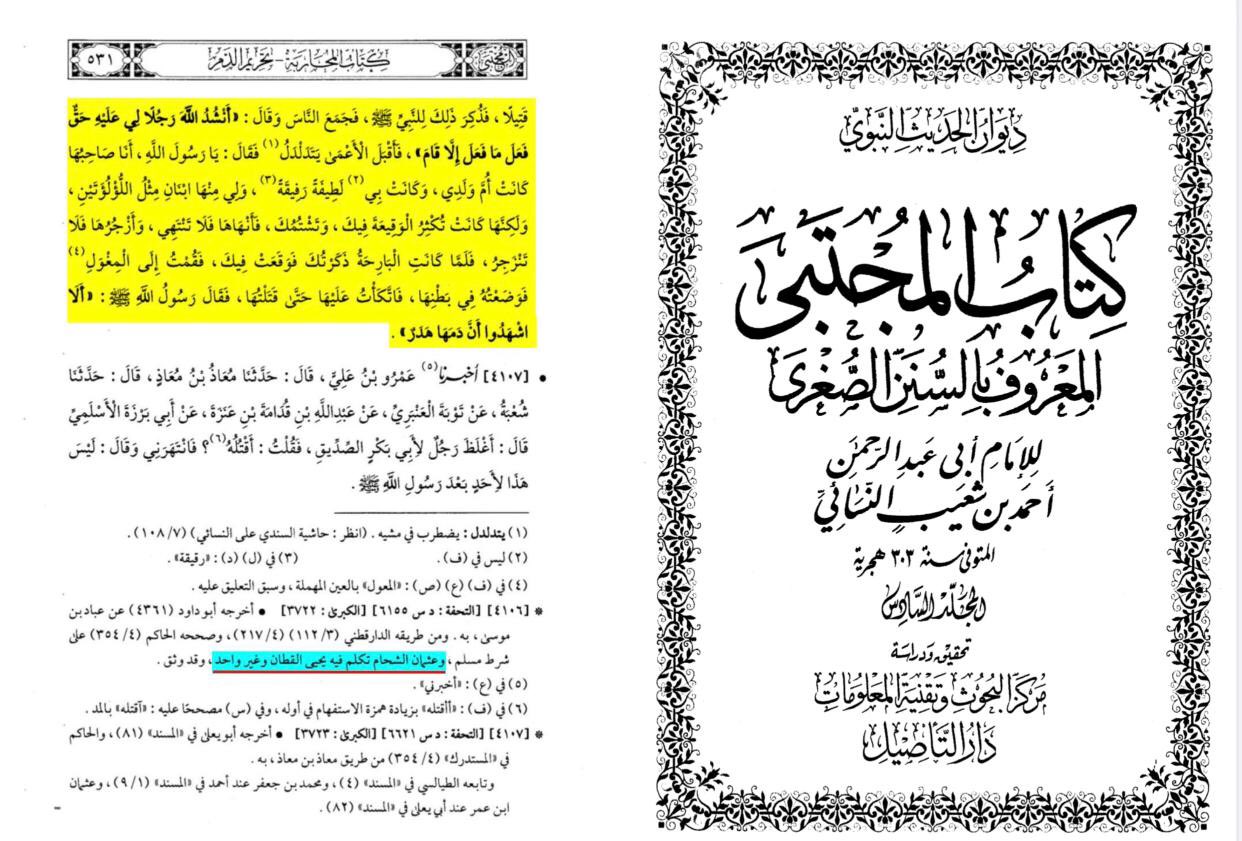
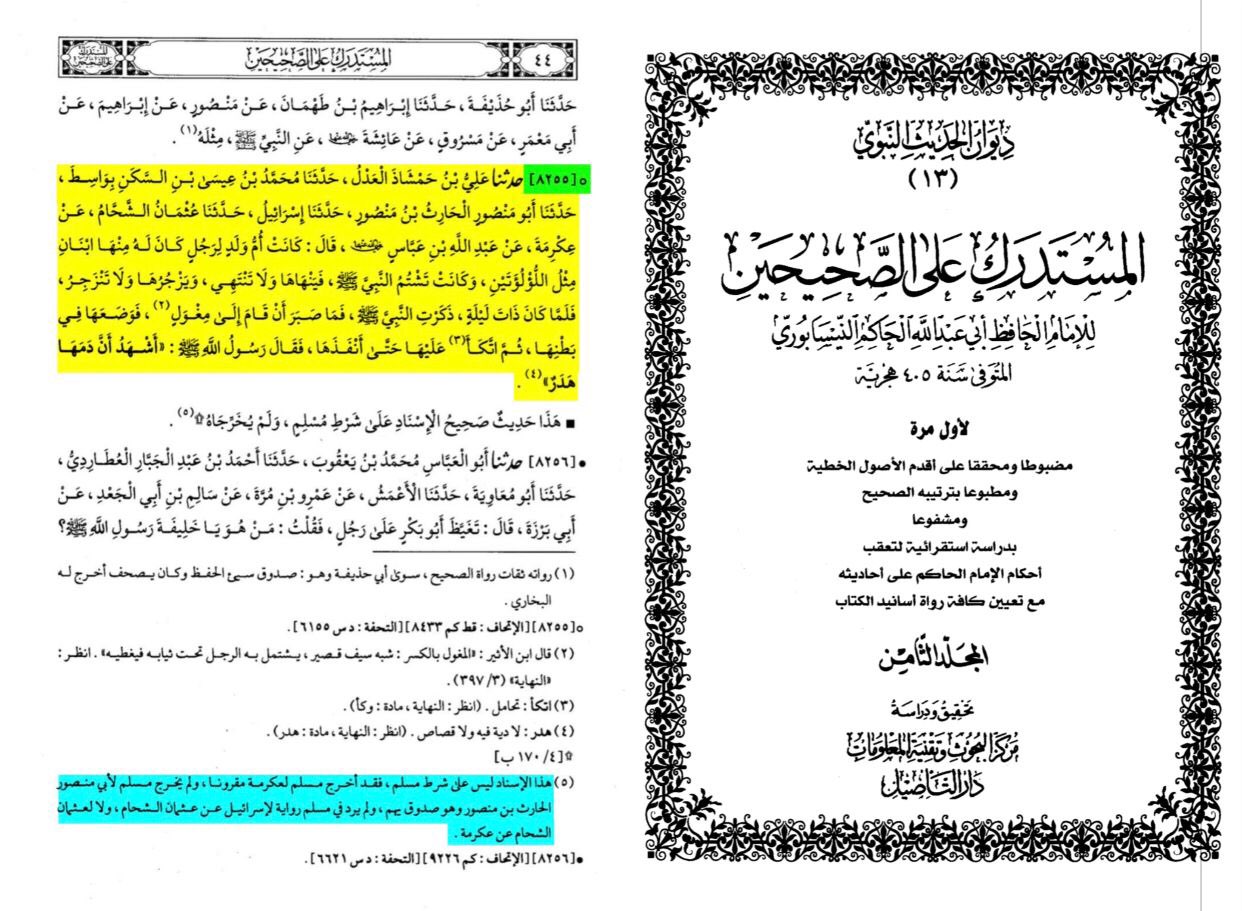 Ibn Muflih writes:
تَحْرُمُ إقَامَةُ حَدٍّ إلَّا لِإِمَامٍ أَوْ نَائِبِهِ
It is forbidden to establish a legal punishment unless it is done by the leader or his deputy.
Source: al-Furū’ wa Taṣḥīḥ al-Furū’ 10/29
And according to the Kuwaiti Encyclopedia of Fiqh:
اتَّفَقَ الْفُقَهَاءُ عَلَى أَنَّهُ لاَ يُقِيمُ الْحَدَّ إلا الإمام أَوْ نَائِبُهُ وَذَلِكَ لِمَصْلَحَةِ الْعِبَادِ وَهِيَ صِيَانَةُ أَنْفُسِهِمْ وَأَمْوَالِهِمْ وَأَعْرَاضِهِمْ
The jurists came to a consensus that a legal punishment may not be implemented unless by the leader or his deputy. That is in the best interest of people, which is to safeguard their lives, their property, and their reputations.
Source: al-Mawsū’at al-Fiqhīyah al-Kuwaytīyah 17/144
This principle, known in the West as due process, is essential to civil society. Citing the hadith of the blind man to circumvent it is a very dangerous proposition.
If the incident did in fact occur, then the slander (waqi’) and disparagement (shatm) committed by the woman must have been done in manner that was aiding or inciting enemy forces, as the Muslims in Medina at the time were fighting a defensive war against the idolaters of Mecca.
Ibn Taymiyyah considered the possibility of this interpretation, writing:
الوجه الثالث أن هذا وإن كان حدا فهو قتل حربي أيضا فصار بمنزلة قتل حربي تحتم قتله وهذا يجوز قتله لكل أحد
A third view is that, if this was a legal punishment, then it was also the killing of a combatant. Thus, she had the status of an enemy combatant who must be killed. This type of killing is permissible for anyone.
Source: al-Ṣārim al-Maslūl 1/286
The Prophet (ṣ) did not kill people just for insulting him. Many people insulted him, cursed him, and harmed him, yet he was forgiving, patient, and forbearing. The legal maxim of no-harm requires that one can only harm others if it is necessary to avoid a greater harm.
The Prophet (ṣ) also would not have allowed a man to designate himself as judge, jury, and executioner. If the Prophet (ṣ) did in fact pardon the man for killing his concubine, it could only have been in such a case that she was aiding or inciting the enemy. No one needs permission from authorities to fight or kill someone who is waging war against them.
As for the legal implications of the hadith – the context in which it is usually cited – is it really necessary in Islam to punish blasphemers with death?
Al-San’ani commented on the hadith of the blind man specifically, writing:
فَإِنْ كَانَ مُسْلِمًا كَانَ سَبُّهُ لَهُ صَلَّى اللَّهُ عَلَيْهِ وَسَلَّمَ رِدَّةً … وَنَقَلَ ابْنُ الْمُنْذِرِ عَنْ الْأَوْزَاعِيِّ وَاللَّيْثِ أَنَّهُ يُسْتَتَابُ
If it was a Muslim who cursed the Prophet (ṣ) as an act of apostasy… it has been transmitted by Ibn al-Mundhir from Al-Awza’i and Al-Layth that they should be imprisoned until they repent.
Source: Subul al-Salām 2/384
Blasphemy committed by a Muslim, in the eyes of the jurists, was equal to treason or sedition, that is, incitement to violently overthrow the social order established upon Islamic law. However, some scholars, including the Caliph Umar (ra), lightened the sentence of apostasy in certain situations.
Anas ibn Malik reported: I said, “O commander of the faithful, some people have turned renegade against Islam and joined the idolaters. What is to be done to them other than killing?” Umar ibn al-Khattab, may Allah be pleased with him, said:
لَأَنْ أَكُونَ أَخَذْتُهُمْ سِلْمًا أَحَبُّ إِلَيَّ مِمَّا طَلَعَتْ عَلَيْهِ الشَّمْسُ مِنْ صَفْرَاءَ أَوْ بَيْضَاءَ
That I take hold of them on peaceful terms is more beloved to me than everything over which the sun rises, from the horizon to the zenith.
I said, “O commander of the faithful, what would you do if you took hold of them?” Umar said:
كُنْتُ عَارِضًا عَلَيْهِمُ الْبَابَ الَّذِي خَرَجُوا مِنْهُ أَنْ يَدْخُلُوا فِيهِ فَإِنْ فَعَلُوا ذَلِكَ قَبِلْتُ مِنْهُمْ وَإِلَّا اسْتَوْدَعْتُهُمُ السِّجْنَ
I would offer them the door through which they exited, that they would enter it again. If they did so, I would accept it from them; otherwise I would keep them in prison.
Source: Muṣannaf ‘Abd al-Razzāq 18696, Grade: Sahih
Ma’mar reported: Some residents of the peninsula told me that some people had embraced Islam, but it was not long until they became apostates. Maymun ibn Mihran wrote to Umar Ibn Abdul Aziz, may Allah have mercy on him, regarding them and Umar wrote back saying:
رُدَّ عَلَيْهِمُ الْجِزْيَةَ وَدَعْهُمْ
Let them return to paying tribute and leave them alone.
Source: Muṣannaf ‘Abd al-Razzāq 18102
‘Amr ibn Qays reported: Ibrahim al-Nakha’i, may Allah have mercy on him, said:
الْمُرْتَدّ يُسْتَتَابُ أَبَدًا
The apostate is imprisoned indefinitely until he repents.
And Sufyan al-Thawri said:
هَذَا الَّذِي نَأْخُذُ بِهِ
This is what we adhere to.
Source: Muṣannaf ‘Abd al-Razzāq 18697
Abu Razin reported: Ibn Abbas, may Allah be pleased with him, said:
تُحْبَسُ وَلَا تُقْتَلُ الْمَرْأَةُ تَرْتَدُّ
The female apostate is imprisoned and is not killed for her apostasy.
Source: Muṣannaf ‘Abd al-Razzāq 18731
Al-Layth reported: ‘Ata’, may Allah have mercy on him, said:
الْمُرْتَدَّةِ لَا تُقْتَلُ
The female apostate is not killed.
Source: Muṣannaf Ibn Abī Shaybah 28995
Abu Harrah reported: Al-Hasan, may Allah have mercy on him, said:
الْمَرْأَةِ تَرْتَدُّ عَنِ الْإِسْلَامِ لَا تُقْتَلُ تُحْبَسُ
The woman who renegades against Islam is not killed. She is imprisoned.
Source: Muṣannaf Ibn Abī Shaybah 28997
There was no absolute consensus that the death penalty was mandated in every case of apostasy or blasphemy, which indicates that it is more likely subject to discretionary punishment (ta’zir). The authorities can lighten the sentence if this is in the best interests of Muslim society and achieves the objectives of Islamic law, one of which is mercy for the creation.
Ibrahim al-Nakha’i said specifically in the context of apostasy:
ادْرَءُوا الْحُدُودَ عَنِ الْمُسْلِمِينَ مَا اسْتَطَعْتُمْ فَإِذَا وَجَدْتُمْ لِلْمُسْلِمِ مَخْرَجًا فَادْرَءُوا عَنْهُ فَإِنَّهُ أَنْ يَخْطَأَ حَاكِمٌ مِنْ حُكَّامِ الْمُسْلِمِينَ فِي الْعَفْوِ خَيْرٌ مِنْ أَنْ يَخْطَأَ فِي الْعُقُوبَةِ
Avoid legal punishments upon the Muslims as much as you can. If you find a way out for a Muslim, leave him to his way. For a Muslim judge to err in pardoning the criminal is better than to err in punishing him.
Source: Muṣannaf ‘Abd al-Razzāq 18698
If blasphemy was committed by a non-Muslim, the jurists also did not agree that the death penalty was mandatory. Al-San’ani continues:
وَعَنْ الْحَنَفِيَّةِ أَنَّهُ يُعَزَّرُ الْمُعَاهَدُ ولا يقتل واحتج الطحاوي بأنه صلى الله عليه وسلم لم يقتل اليهود الذي قالوا السام عليك
It is narrated from the Hanafi scholars that the covenanted person is given a discretionary punishment and is not killed. Al-Tahawi cited as evidence that the Prophet (s) did not kill the Jews who came to him and they said (in a play on words): Death be upon you!
Source: Subul al-Salam 2/385
Indeed, one can find many instances in the biography of the Prophet (ṣ) when he was merciful, forgiving, and patient with those who directly insulted him.
Aisha reported: A group of Jews asked permission to visit the Prophet and when they were admitted, they said, “Death be upon you!” I said to them, “Rather, death and the curse of Allah be upon you!” The Prophet, peace and blessings be upon him, said:
يَا عَائِشَةُ إِنَّ اللَّهَ رَفِيقٌ يُحِبُّ الرِّفْقَ فِي الْأَمْرِ كُلِّهِ
O Aisha, Allah is gentle and he loves gentleness in all matters.
Source: Ṣaḥīḥ al-Bukhārī 6528, Grade: Muttafaqun Alayhi
In another narration, the Prophet (ṣ) said:
يَا عَائِشَةُ عَلَيْكِ بِالرِّفْقِ وَإِيَّاكِ وَالْعُنْفَ وَالْفُحْشَ
O Aisha, you must be gentle and beware of harsh and profane words.
Source: Ṣaḥīḥ al-Bukhārī 5683, Grade: Sahih
Mercy and patience with blasphemy was the general rule applied by the Prophet (ṣ), while legal punishment was the exception only when it was compounded by high crimes of apostasy, treason, warfare, sedition, or incitement.
In sum, the hadith of the blind man summarily killing his concubine without due process is a weak narration due to the doubtfulness of Uthman al-Shuhham. If the incident really did take place, then it can only be interpreted in accordance with moral and legal principles established by an enormity of other sound texts. No one may carry out legal punishments without properly constituted authority, and blasphemy by itself is not punishable with death.
Success comes from Allah, and Allah knows best.
Now lets talk about kaab bin Al-abhar
First off he used to persue Quraish to kill the prophet and fight him
Translation: “He cursed the prophet and his companions in his poems and he gets Quraish and keeps persuading them in fighting him and killing him”
-Source: Sharh Sunan Abi dawud ibn ruslan volume 13 page number 21 explaining narration number 3000
Ibn Muflih writes:
تَحْرُمُ إقَامَةُ حَدٍّ إلَّا لِإِمَامٍ أَوْ نَائِبِهِ
It is forbidden to establish a legal punishment unless it is done by the leader or his deputy.
Source: al-Furū’ wa Taṣḥīḥ al-Furū’ 10/29
And according to the Kuwaiti Encyclopedia of Fiqh:
اتَّفَقَ الْفُقَهَاءُ عَلَى أَنَّهُ لاَ يُقِيمُ الْحَدَّ إلا الإمام أَوْ نَائِبُهُ وَذَلِكَ لِمَصْلَحَةِ الْعِبَادِ وَهِيَ صِيَانَةُ أَنْفُسِهِمْ وَأَمْوَالِهِمْ وَأَعْرَاضِهِمْ
The jurists came to a consensus that a legal punishment may not be implemented unless by the leader or his deputy. That is in the best interest of people, which is to safeguard their lives, their property, and their reputations.
Source: al-Mawsū’at al-Fiqhīyah al-Kuwaytīyah 17/144
This principle, known in the West as due process, is essential to civil society. Citing the hadith of the blind man to circumvent it is a very dangerous proposition.
If the incident did in fact occur, then the slander (waqi’) and disparagement (shatm) committed by the woman must have been done in manner that was aiding or inciting enemy forces, as the Muslims in Medina at the time were fighting a defensive war against the idolaters of Mecca.
Ibn Taymiyyah considered the possibility of this interpretation, writing:
الوجه الثالث أن هذا وإن كان حدا فهو قتل حربي أيضا فصار بمنزلة قتل حربي تحتم قتله وهذا يجوز قتله لكل أحد
A third view is that, if this was a legal punishment, then it was also the killing of a combatant. Thus, she had the status of an enemy combatant who must be killed. This type of killing is permissible for anyone.
Source: al-Ṣārim al-Maslūl 1/286
The Prophet (ṣ) did not kill people just for insulting him. Many people insulted him, cursed him, and harmed him, yet he was forgiving, patient, and forbearing. The legal maxim of no-harm requires that one can only harm others if it is necessary to avoid a greater harm.
The Prophet (ṣ) also would not have allowed a man to designate himself as judge, jury, and executioner. If the Prophet (ṣ) did in fact pardon the man for killing his concubine, it could only have been in such a case that she was aiding or inciting the enemy. No one needs permission from authorities to fight or kill someone who is waging war against them.
As for the legal implications of the hadith – the context in which it is usually cited – is it really necessary in Islam to punish blasphemers with death?
Al-San’ani commented on the hadith of the blind man specifically, writing:
فَإِنْ كَانَ مُسْلِمًا كَانَ سَبُّهُ لَهُ صَلَّى اللَّهُ عَلَيْهِ وَسَلَّمَ رِدَّةً … وَنَقَلَ ابْنُ الْمُنْذِرِ عَنْ الْأَوْزَاعِيِّ وَاللَّيْثِ أَنَّهُ يُسْتَتَابُ
If it was a Muslim who cursed the Prophet (ṣ) as an act of apostasy… it has been transmitted by Ibn al-Mundhir from Al-Awza’i and Al-Layth that they should be imprisoned until they repent.
Source: Subul al-Salām 2/384
Blasphemy committed by a Muslim, in the eyes of the jurists, was equal to treason or sedition, that is, incitement to violently overthrow the social order established upon Islamic law. However, some scholars, including the Caliph Umar (ra), lightened the sentence of apostasy in certain situations.
Anas ibn Malik reported: I said, “O commander of the faithful, some people have turned renegade against Islam and joined the idolaters. What is to be done to them other than killing?” Umar ibn al-Khattab, may Allah be pleased with him, said:
لَأَنْ أَكُونَ أَخَذْتُهُمْ سِلْمًا أَحَبُّ إِلَيَّ مِمَّا طَلَعَتْ عَلَيْهِ الشَّمْسُ مِنْ صَفْرَاءَ أَوْ بَيْضَاءَ
That I take hold of them on peaceful terms is more beloved to me than everything over which the sun rises, from the horizon to the zenith.
I said, “O commander of the faithful, what would you do if you took hold of them?” Umar said:
كُنْتُ عَارِضًا عَلَيْهِمُ الْبَابَ الَّذِي خَرَجُوا مِنْهُ أَنْ يَدْخُلُوا فِيهِ فَإِنْ فَعَلُوا ذَلِكَ قَبِلْتُ مِنْهُمْ وَإِلَّا اسْتَوْدَعْتُهُمُ السِّجْنَ
I would offer them the door through which they exited, that they would enter it again. If they did so, I would accept it from them; otherwise I would keep them in prison.
Source: Muṣannaf ‘Abd al-Razzāq 18696, Grade: Sahih
Ma’mar reported: Some residents of the peninsula told me that some people had embraced Islam, but it was not long until they became apostates. Maymun ibn Mihran wrote to Umar Ibn Abdul Aziz, may Allah have mercy on him, regarding them and Umar wrote back saying:
رُدَّ عَلَيْهِمُ الْجِزْيَةَ وَدَعْهُمْ
Let them return to paying tribute and leave them alone.
Source: Muṣannaf ‘Abd al-Razzāq 18102
‘Amr ibn Qays reported: Ibrahim al-Nakha’i, may Allah have mercy on him, said:
الْمُرْتَدّ يُسْتَتَابُ أَبَدًا
The apostate is imprisoned indefinitely until he repents.
And Sufyan al-Thawri said:
هَذَا الَّذِي نَأْخُذُ بِهِ
This is what we adhere to.
Source: Muṣannaf ‘Abd al-Razzāq 18697
Abu Razin reported: Ibn Abbas, may Allah be pleased with him, said:
تُحْبَسُ وَلَا تُقْتَلُ الْمَرْأَةُ تَرْتَدُّ
The female apostate is imprisoned and is not killed for her apostasy.
Source: Muṣannaf ‘Abd al-Razzāq 18731
Al-Layth reported: ‘Ata’, may Allah have mercy on him, said:
الْمُرْتَدَّةِ لَا تُقْتَلُ
The female apostate is not killed.
Source: Muṣannaf Ibn Abī Shaybah 28995
Abu Harrah reported: Al-Hasan, may Allah have mercy on him, said:
الْمَرْأَةِ تَرْتَدُّ عَنِ الْإِسْلَامِ لَا تُقْتَلُ تُحْبَسُ
The woman who renegades against Islam is not killed. She is imprisoned.
Source: Muṣannaf Ibn Abī Shaybah 28997
There was no absolute consensus that the death penalty was mandated in every case of apostasy or blasphemy, which indicates that it is more likely subject to discretionary punishment (ta’zir). The authorities can lighten the sentence if this is in the best interests of Muslim society and achieves the objectives of Islamic law, one of which is mercy for the creation.
Ibrahim al-Nakha’i said specifically in the context of apostasy:
ادْرَءُوا الْحُدُودَ عَنِ الْمُسْلِمِينَ مَا اسْتَطَعْتُمْ فَإِذَا وَجَدْتُمْ لِلْمُسْلِمِ مَخْرَجًا فَادْرَءُوا عَنْهُ فَإِنَّهُ أَنْ يَخْطَأَ حَاكِمٌ مِنْ حُكَّامِ الْمُسْلِمِينَ فِي الْعَفْوِ خَيْرٌ مِنْ أَنْ يَخْطَأَ فِي الْعُقُوبَةِ
Avoid legal punishments upon the Muslims as much as you can. If you find a way out for a Muslim, leave him to his way. For a Muslim judge to err in pardoning the criminal is better than to err in punishing him.
Source: Muṣannaf ‘Abd al-Razzāq 18698
If blasphemy was committed by a non-Muslim, the jurists also did not agree that the death penalty was mandatory. Al-San’ani continues:
وَعَنْ الْحَنَفِيَّةِ أَنَّهُ يُعَزَّرُ الْمُعَاهَدُ ولا يقتل واحتج الطحاوي بأنه صلى الله عليه وسلم لم يقتل اليهود الذي قالوا السام عليك
It is narrated from the Hanafi scholars that the covenanted person is given a discretionary punishment and is not killed. Al-Tahawi cited as evidence that the Prophet (s) did not kill the Jews who came to him and they said (in a play on words): Death be upon you!
Source: Subul al-Salam 2/385
Indeed, one can find many instances in the biography of the Prophet (ṣ) when he was merciful, forgiving, and patient with those who directly insulted him.
Aisha reported: A group of Jews asked permission to visit the Prophet and when they were admitted, they said, “Death be upon you!” I said to them, “Rather, death and the curse of Allah be upon you!” The Prophet, peace and blessings be upon him, said:
يَا عَائِشَةُ إِنَّ اللَّهَ رَفِيقٌ يُحِبُّ الرِّفْقَ فِي الْأَمْرِ كُلِّهِ
O Aisha, Allah is gentle and he loves gentleness in all matters.
Source: Ṣaḥīḥ al-Bukhārī 6528, Grade: Muttafaqun Alayhi
In another narration, the Prophet (ṣ) said:
يَا عَائِشَةُ عَلَيْكِ بِالرِّفْقِ وَإِيَّاكِ وَالْعُنْفَ وَالْفُحْشَ
O Aisha, you must be gentle and beware of harsh and profane words.
Source: Ṣaḥīḥ al-Bukhārī 5683, Grade: Sahih
Mercy and patience with blasphemy was the general rule applied by the Prophet (ṣ), while legal punishment was the exception only when it was compounded by high crimes of apostasy, treason, warfare, sedition, or incitement.
In sum, the hadith of the blind man summarily killing his concubine without due process is a weak narration due to the doubtfulness of Uthman al-Shuhham. If the incident really did take place, then it can only be interpreted in accordance with moral and legal principles established by an enormity of other sound texts. No one may carry out legal punishments without properly constituted authority, and blasphemy by itself is not punishable with death.
Success comes from Allah, and Allah knows best.
Now lets talk about kaab bin Al-abhar
First off he used to persue Quraish to kill the prophet and fight him
Translation: “He cursed the prophet and his companions in his poems and he gets Quraish and keeps persuading them in fighting him and killing him”
-Source: Sharh Sunan Abi dawud ibn ruslan volume 13 page number 21 explaining narration number 3000
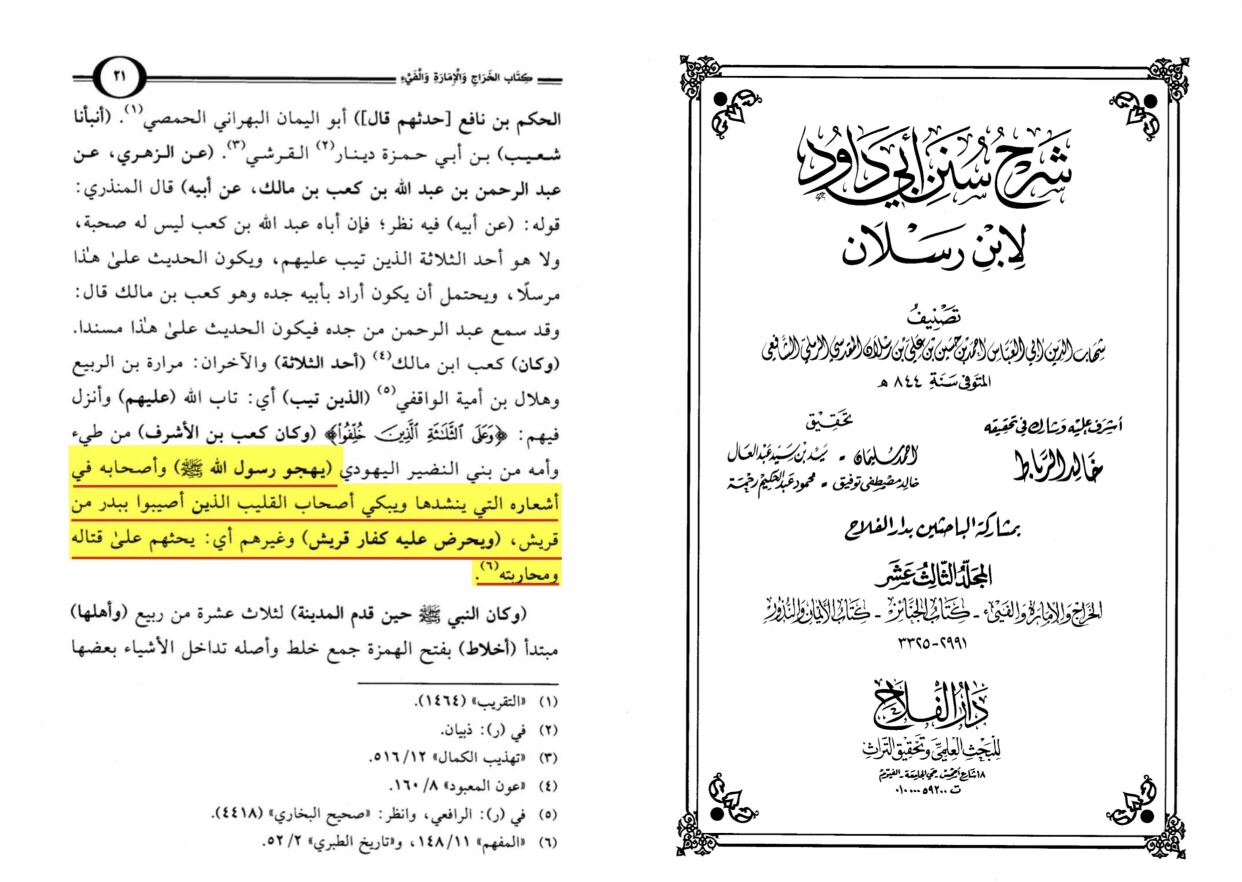 It is said Prophet Muhammad assassinated a man only for criticizing him. Is Islam intolerant of criticism?
The story cited in this regard is the killing of Ka’b ibn al-Ashraf, who was a leader among the armies that were fighting a war of extermination against the Muslims, as is made clear in the several narrations concerning this incident. He was killed because he was an enemy combatant who also criticized Islam in poetry. Anti-Muslim writers only cite his poetry while they ignore his unwarranted aggression.
Badr al-Din al-‘Ayni comments on this story, writing:
في هذا كله أنه لم يقتلهم بمجرد سبهم وإنما كانوا عونا عليه ويجمعون من يحاربونه ويؤيده
In these traditions it is shown that they were not killed merely for their insults. Indeed, they were only killed due to their aiding the enemy and preparing for war against him.
Source: ʻUmdat al-Qāriʼ Sharḥ Ṣaḥīḥ al-Bukhārī 24/124
It is said Prophet Muhammad assassinated a man only for criticizing him. Is Islam intolerant of criticism?
The story cited in this regard is the killing of Ka’b ibn al-Ashraf, who was a leader among the armies that were fighting a war of extermination against the Muslims, as is made clear in the several narrations concerning this incident. He was killed because he was an enemy combatant who also criticized Islam in poetry. Anti-Muslim writers only cite his poetry while they ignore his unwarranted aggression.
Badr al-Din al-‘Ayni comments on this story, writing:
في هذا كله أنه لم يقتلهم بمجرد سبهم وإنما كانوا عونا عليه ويجمعون من يحاربونه ويؤيده
In these traditions it is shown that they were not killed merely for their insults. Indeed, they were only killed due to their aiding the enemy and preparing for war against him.
Source: ʻUmdat al-Qāriʼ Sharḥ Ṣaḥīḥ al-Bukhārī 24/124
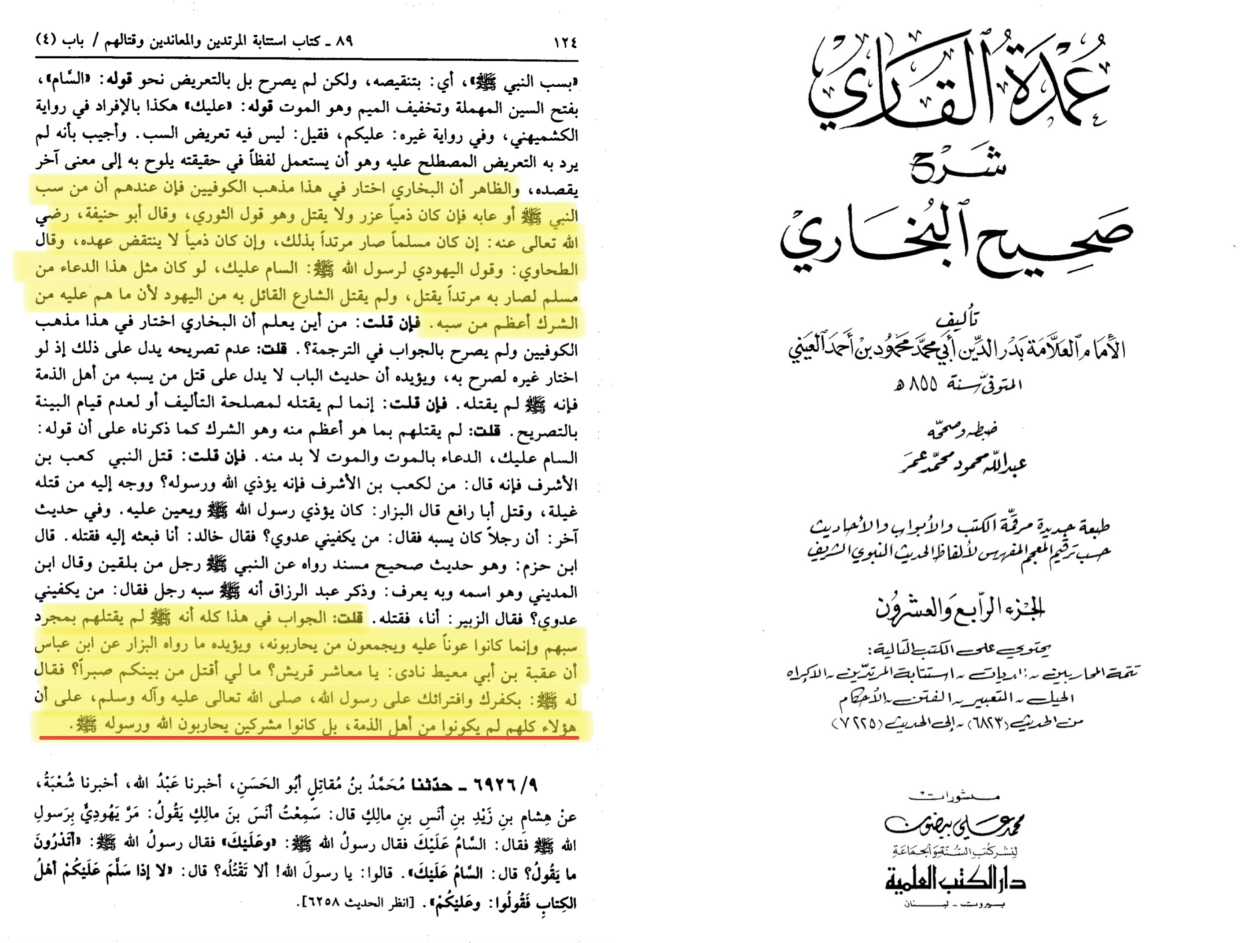 Ka’b ibn Al-Ashraf had made known his support for violence against the Muslim community, so killing him was done as a legitimate act of self-defense, not simply because he had criticized the Prophet (ṣ). Rather, the Prophet (ṣ) condemned any assassination that violates a peace treaty, pledge, promise, or security agreement.
Abu Huraira reported: The Messenger of Allah, peace and blessings be upon him, said:
الْإِيمَانُ قَيَّدَ الْفَتْكَ لَا يَفْتِكُ مُؤْمِنٌ
Faith has prevented treacherous assassination. A believer does not assassinate.
Source: Sunan Abī Dāwūd 2769, Grade: Sahih
مَعْنَى الْحَدِيثِ أَنَّ الْإِيمَانَ يَمْنَعُ مِنَ الْفَتْكِ الَّذِي هُوَ الْقَتْلُ بَعْدَ الْأَمَانِ غَدْرًا
The meaning of the tradition is that faith prohibits assassination, which is to treacherously kill a person after pledging them security.
Source: ‘Awn al-Maʻbūd 2769
In fact, the Prophet (ṣ) never took revenge for acts of abuse against himself, but instead he would only implement justice with due process.
Aisha reported:
وَمَا انْتَقَمَ رَسُولُ اللَّهِ صَلَّى اللَّهُ عَلَيْهِ وَسَلَّمَ لِنَفْسِهِ إِلَّا أَنْ تُنْتَهَكَ حُرْمَةُ اللَّهِ فَيَنْتَقِمَ لِلَّهِ بِهَا
The Messenger of Allah, peace and blessings be upon him, did not take revenge for anything against himself, but if the sacred limits of Allah were violated, he would retaliate for the sake of Allah.
Source: Ṣaḥīḥ al-Bukhārī 3367, Grade: Muttafaqun Alayhi
There were many instances in the Prophet’s life in which he was insulted, mocked, and harmed by his enemies, and he responded with patience, forbearance, and forgiveness.
Aisha reported: A group of Jews asked permission to visit the Prophet and when they were admitted they said, “Death be upon you.” I said to them, “Rather death and the curse of Allah be upon you!” The Prophet, peace and blessings be upon him, said:
يَا عَائِشَةُ إِنَّ اللَّهَ رَفِيقٌ يُحِبُّ الرِّفْقَ فِي الْأَمْرِ كُلِّهِ
O Aisha, Allah is kind and He loves kindness in all matters.
Source: Ṣaḥīḥ al-Bukhārī 6528, Grade: Muttafaqun Alayhi
Ka’b ibn Al-Ashraf had made known his support for violence against the Muslim community, so killing him was done as a legitimate act of self-defense, not simply because he had criticized the Prophet (ṣ). Rather, the Prophet (ṣ) condemned any assassination that violates a peace treaty, pledge, promise, or security agreement.
Abu Huraira reported: The Messenger of Allah, peace and blessings be upon him, said:
الْإِيمَانُ قَيَّدَ الْفَتْكَ لَا يَفْتِكُ مُؤْمِنٌ
Faith has prevented treacherous assassination. A believer does not assassinate.
Source: Sunan Abī Dāwūd 2769, Grade: Sahih
مَعْنَى الْحَدِيثِ أَنَّ الْإِيمَانَ يَمْنَعُ مِنَ الْفَتْكِ الَّذِي هُوَ الْقَتْلُ بَعْدَ الْأَمَانِ غَدْرًا
The meaning of the tradition is that faith prohibits assassination, which is to treacherously kill a person after pledging them security.
Source: ‘Awn al-Maʻbūd 2769
In fact, the Prophet (ṣ) never took revenge for acts of abuse against himself, but instead he would only implement justice with due process.
Aisha reported:
وَمَا انْتَقَمَ رَسُولُ اللَّهِ صَلَّى اللَّهُ عَلَيْهِ وَسَلَّمَ لِنَفْسِهِ إِلَّا أَنْ تُنْتَهَكَ حُرْمَةُ اللَّهِ فَيَنْتَقِمَ لِلَّهِ بِهَا
The Messenger of Allah, peace and blessings be upon him, did not take revenge for anything against himself, but if the sacred limits of Allah were violated, he would retaliate for the sake of Allah.
Source: Ṣaḥīḥ al-Bukhārī 3367, Grade: Muttafaqun Alayhi
There were many instances in the Prophet’s life in which he was insulted, mocked, and harmed by his enemies, and he responded with patience, forbearance, and forgiveness.
Aisha reported: A group of Jews asked permission to visit the Prophet and when they were admitted they said, “Death be upon you.” I said to them, “Rather death and the curse of Allah be upon you!” The Prophet, peace and blessings be upon him, said:
يَا عَائِشَةُ إِنَّ اللَّهَ رَفِيقٌ يُحِبُّ الرِّفْقَ فِي الْأَمْرِ كُلِّهِ
O Aisha, Allah is kind and He loves kindness in all matters.
Source: Ṣaḥīḥ al-Bukhārī 6528, Grade: Muttafaqun Alayhi
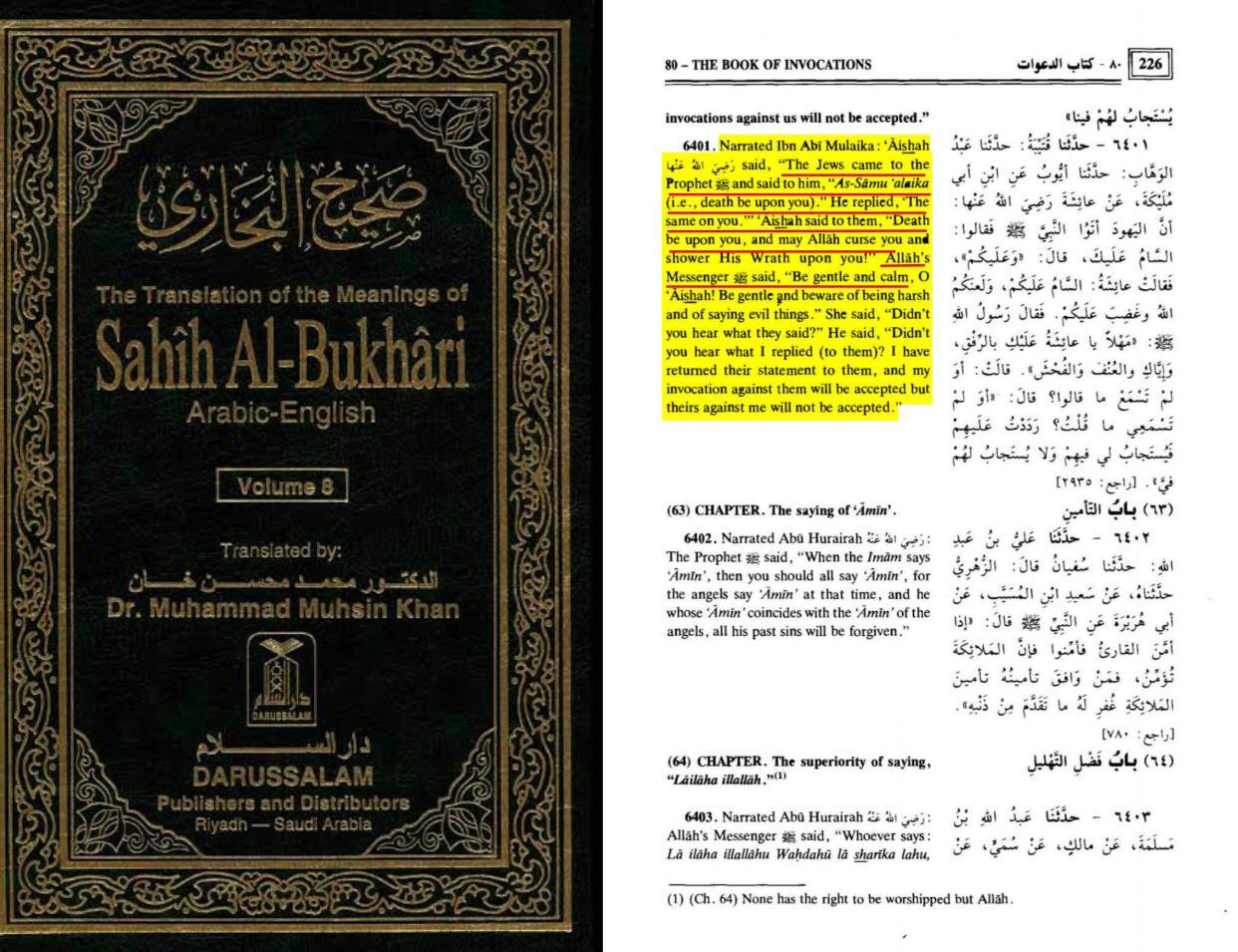 This was because the Prophet would apply the teachings of the Quran which council forbearance and forgiveness in the face of insults and mockery.
Allah said:
خُذِ الْعَفْوَ وَأْمُرْ بِالْعُرْفِ وَأَعْرِضْ عَنِ الْجَاهِلِينَ
Show forgiveness, enjoin what is good, and turn away from the ignorant.
Surat al-A’raf 7:199
And God said:
وَعِبَادُ الرَّحْمَٰنِ الَّذِينَ يَمْشُونَ عَلَى الْأَرْضِ هَوْنًا وَإِذَا خَاطَبَهُمُ الْجَاهِلُونَ قَالُوا سَلَامًا
The servants of the Most Merciful are those who walk upon the earth in humility and when the ignorant address them harshly, they say words of peace.
Surat al-Furqan 25:63
And Allah said
وَإِذَا سَمِعُوا اللَّغْوَ أَعْرَضُوا عَنْهُ وَقَالُوا لَنَا أَعْمَالُنَا وَلَكُمْ أَعْمَالُكُمْ سَلَامٌ عَلَيْكُمْ لَا نَبْتَغِي الْجَاهِلِينَ
When they hear ill speech, they turn away from it and say: For us are our deeds, and for you are your deeds. Peace be upon you, for we seek not the way of ignorance.
Surat al-Qasas 28:55
And Allah said
فَاصْبِرْ عَلَىٰ مَا يَقُولُونَ وَسَبِّحْ بِحَمْدِ رَبِّكَ قَبْلَ طُلُوعِ الشَّمْسِ وَقَبْلَ الْغُرُوبِ
Be patient over what they say and exalt the praise of your Lord before the rising of the sun and before its setting.
Surat Qaf 50:39
And finally Allah said:
وَاصْبِرْ عَلَىٰ مَا يَقُولُونَ وَاهْجُرْهُمْ هَجْرًا جَمِيلًا
Be patient over what they say and avoid them with gracious avoidance.
Surat al-Muzammil 73:10
There are various narrations in ibn ishaaq where the prophet orders to kill people just because they insulted however these narrations are false I will mention one it is between 550-551 ibn ishaaq > Abdullah bin najij and Abdullah bin abu bakr incident> however he didn’t meet Abdullah bin abu bakr in his life and Abdullah bin najih wasn’t there so the narration is mursal
In sum, the Prophet (ṣ) did not kill anyone merely because he was insulted, but rather he performed military operations against aggressors in defense of the Muslim community and their freedom to practice Islam.
The founder of Hanafi School, Abu Hanifa notes:
‘If a dhimmi (non-Muslim) insults the Holy Prophet, he will not be killed as punishment. A non-Muslim is not killed for his kufr (denying the Prophet) or shirk (polytheistic beliefs). Kufr/Shirk are bigger sins then sabb e rasool. – (Therefore non-Muslims will not be killed for sabb e rasool.)’ [Al Saif al Maslool]
Further, Abu al-Husayn Ahmad al-Quduri:
‘Non-Muslims insult Allah and say that He has a son and the Zoroastrians say He has an “opposite.” This does not break their covenant of security, therefore the same applies to insult of the prophet PBUH.’
[Al-Tajrid]
Ali ibn Abi Bakr al-Marghinani in Al Hidaya (which is taught all over Pakistan in Hanafi seminaries) states:
‘Insulting the prophet is kufr/disbelief. Since the non-Muslims are not killed for their disbelief, they will not be killed for any addition in their disbelief.’
[Al-Hidaya]
In fact, Tahawi goes on to prescribe a verbal warning as an appropriate punishment for an offending non-Muslim:
‘If a non-Muslim commits blasphemy, he will be given a verbal warning. If he repeats the offense, he will be punished but not killed.’
[Mukhtasar al Tahawi]
As for 9:12 it says if both critism and nakth have been done then fight them not just for insulting the other isnad of the blind man story it is
>shu’ba > ali
Except shu’ba didn’t hear from ali that makes the hadith munqati’ as well that al-daraqutni put this hadith in al-‘ilal check yes
as for the hadith "whoever curses a prophet is killed" it was classed mawdu' (fabricated) by Al-Albani
This was because the Prophet would apply the teachings of the Quran which council forbearance and forgiveness in the face of insults and mockery.
Allah said:
خُذِ الْعَفْوَ وَأْمُرْ بِالْعُرْفِ وَأَعْرِضْ عَنِ الْجَاهِلِينَ
Show forgiveness, enjoin what is good, and turn away from the ignorant.
Surat al-A’raf 7:199
And God said:
وَعِبَادُ الرَّحْمَٰنِ الَّذِينَ يَمْشُونَ عَلَى الْأَرْضِ هَوْنًا وَإِذَا خَاطَبَهُمُ الْجَاهِلُونَ قَالُوا سَلَامًا
The servants of the Most Merciful are those who walk upon the earth in humility and when the ignorant address them harshly, they say words of peace.
Surat al-Furqan 25:63
And Allah said
وَإِذَا سَمِعُوا اللَّغْوَ أَعْرَضُوا عَنْهُ وَقَالُوا لَنَا أَعْمَالُنَا وَلَكُمْ أَعْمَالُكُمْ سَلَامٌ عَلَيْكُمْ لَا نَبْتَغِي الْجَاهِلِينَ
When they hear ill speech, they turn away from it and say: For us are our deeds, and for you are your deeds. Peace be upon you, for we seek not the way of ignorance.
Surat al-Qasas 28:55
And Allah said
فَاصْبِرْ عَلَىٰ مَا يَقُولُونَ وَسَبِّحْ بِحَمْدِ رَبِّكَ قَبْلَ طُلُوعِ الشَّمْسِ وَقَبْلَ الْغُرُوبِ
Be patient over what they say and exalt the praise of your Lord before the rising of the sun and before its setting.
Surat Qaf 50:39
And finally Allah said:
وَاصْبِرْ عَلَىٰ مَا يَقُولُونَ وَاهْجُرْهُمْ هَجْرًا جَمِيلًا
Be patient over what they say and avoid them with gracious avoidance.
Surat al-Muzammil 73:10
There are various narrations in ibn ishaaq where the prophet orders to kill people just because they insulted however these narrations are false I will mention one it is between 550-551 ibn ishaaq > Abdullah bin najij and Abdullah bin abu bakr incident> however he didn’t meet Abdullah bin abu bakr in his life and Abdullah bin najih wasn’t there so the narration is mursal
In sum, the Prophet (ṣ) did not kill anyone merely because he was insulted, but rather he performed military operations against aggressors in defense of the Muslim community and their freedom to practice Islam.
The founder of Hanafi School, Abu Hanifa notes:
‘If a dhimmi (non-Muslim) insults the Holy Prophet, he will not be killed as punishment. A non-Muslim is not killed for his kufr (denying the Prophet) or shirk (polytheistic beliefs). Kufr/Shirk are bigger sins then sabb e rasool. – (Therefore non-Muslims will not be killed for sabb e rasool.)’ [Al Saif al Maslool]
Further, Abu al-Husayn Ahmad al-Quduri:
‘Non-Muslims insult Allah and say that He has a son and the Zoroastrians say He has an “opposite.” This does not break their covenant of security, therefore the same applies to insult of the prophet PBUH.’
[Al-Tajrid]
Ali ibn Abi Bakr al-Marghinani in Al Hidaya (which is taught all over Pakistan in Hanafi seminaries) states:
‘Insulting the prophet is kufr/disbelief. Since the non-Muslims are not killed for their disbelief, they will not be killed for any addition in their disbelief.’
[Al-Hidaya]
In fact, Tahawi goes on to prescribe a verbal warning as an appropriate punishment for an offending non-Muslim:
‘If a non-Muslim commits blasphemy, he will be given a verbal warning. If he repeats the offense, he will be punished but not killed.’
[Mukhtasar al Tahawi]
As for 9:12 it says if both critism and nakth have been done then fight them not just for insulting the other isnad of the blind man story it is
>shu’ba > ali
Except shu’ba didn’t hear from ali that makes the hadith munqati’ as well that al-daraqutni put this hadith in al-‘ilal check yes
as for the hadith "whoever curses a prophet is killed" it was classed mawdu' (fabricated) by Al-Albani
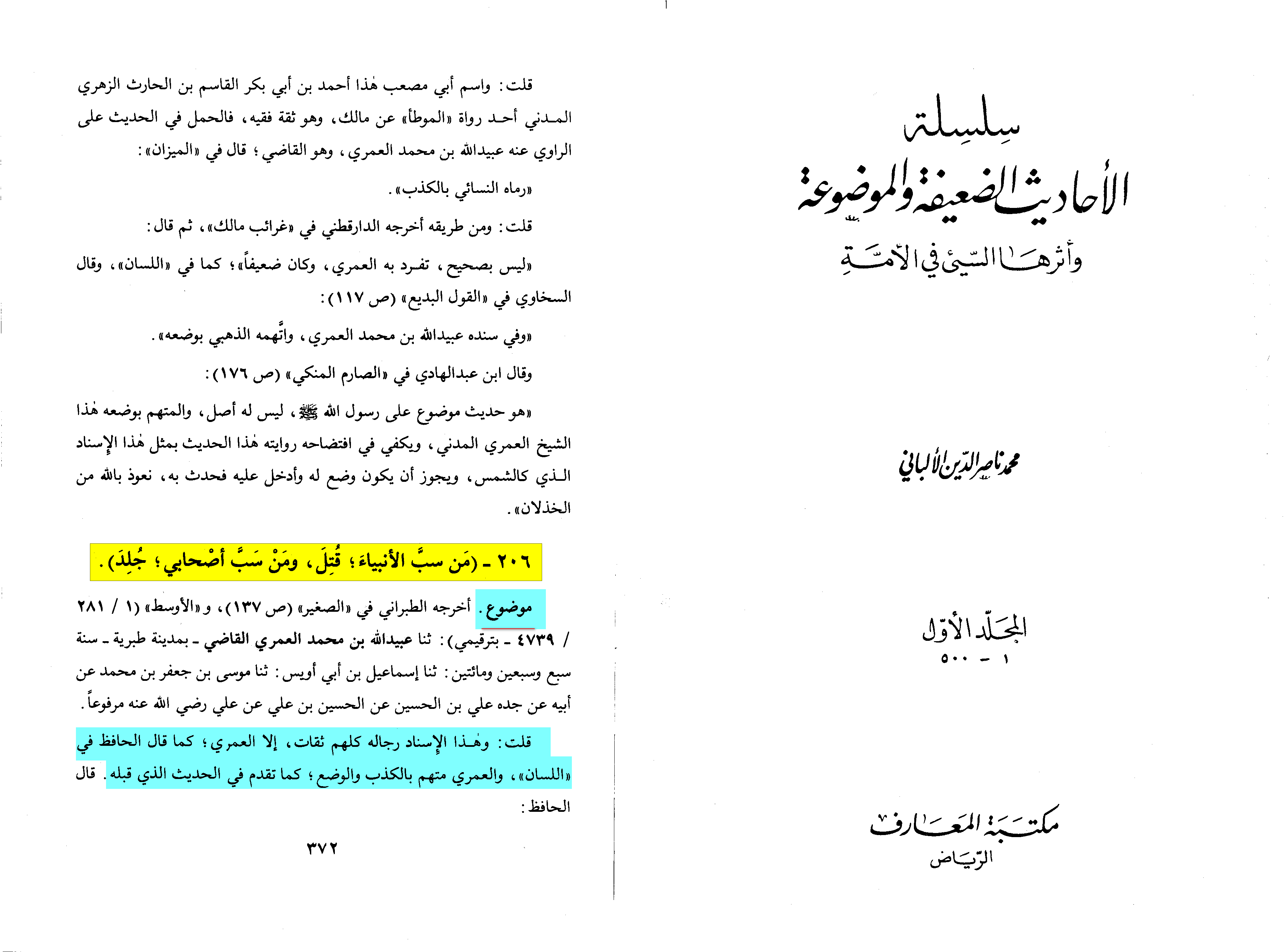 scan remake:
scan remake:
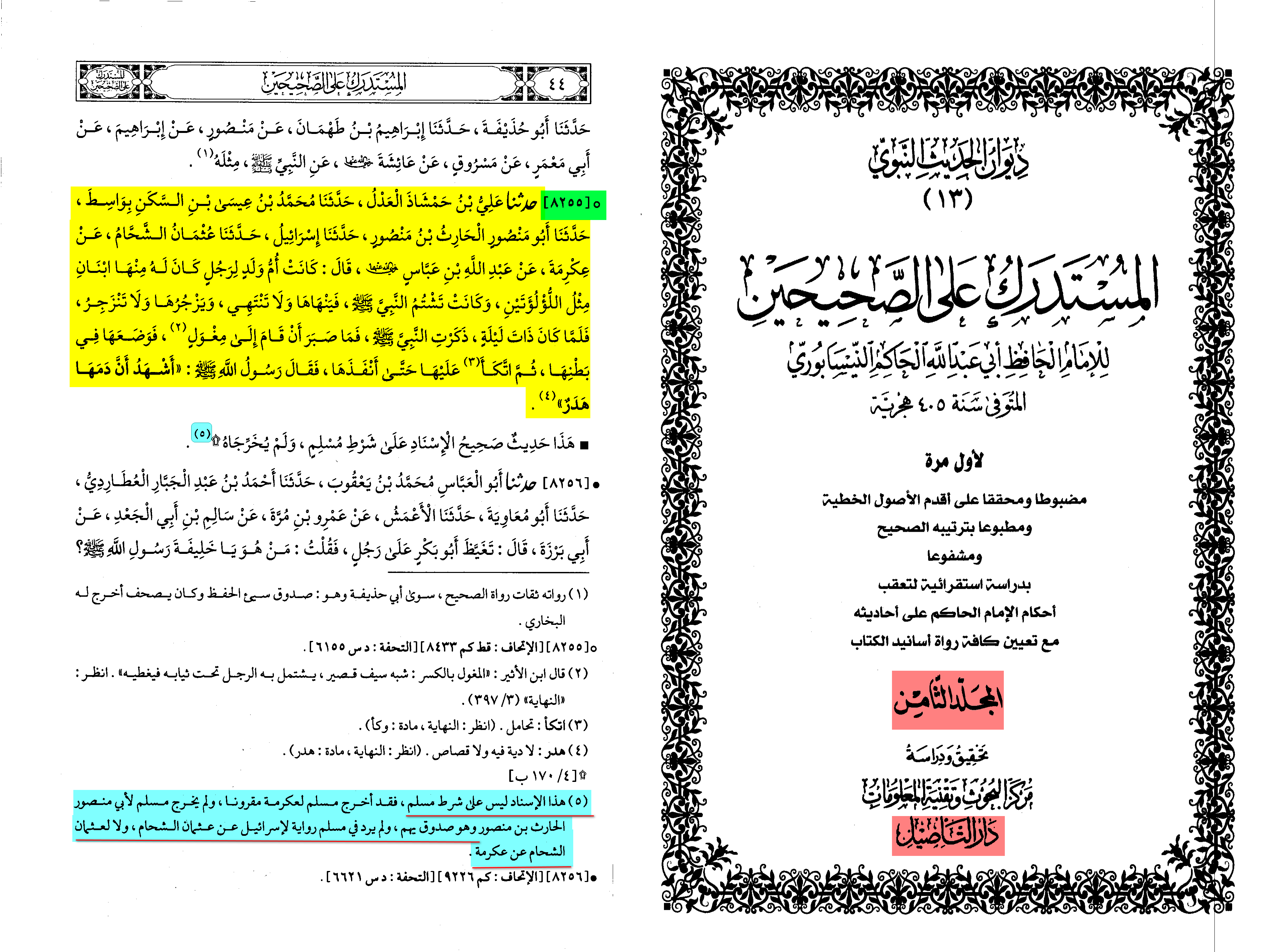
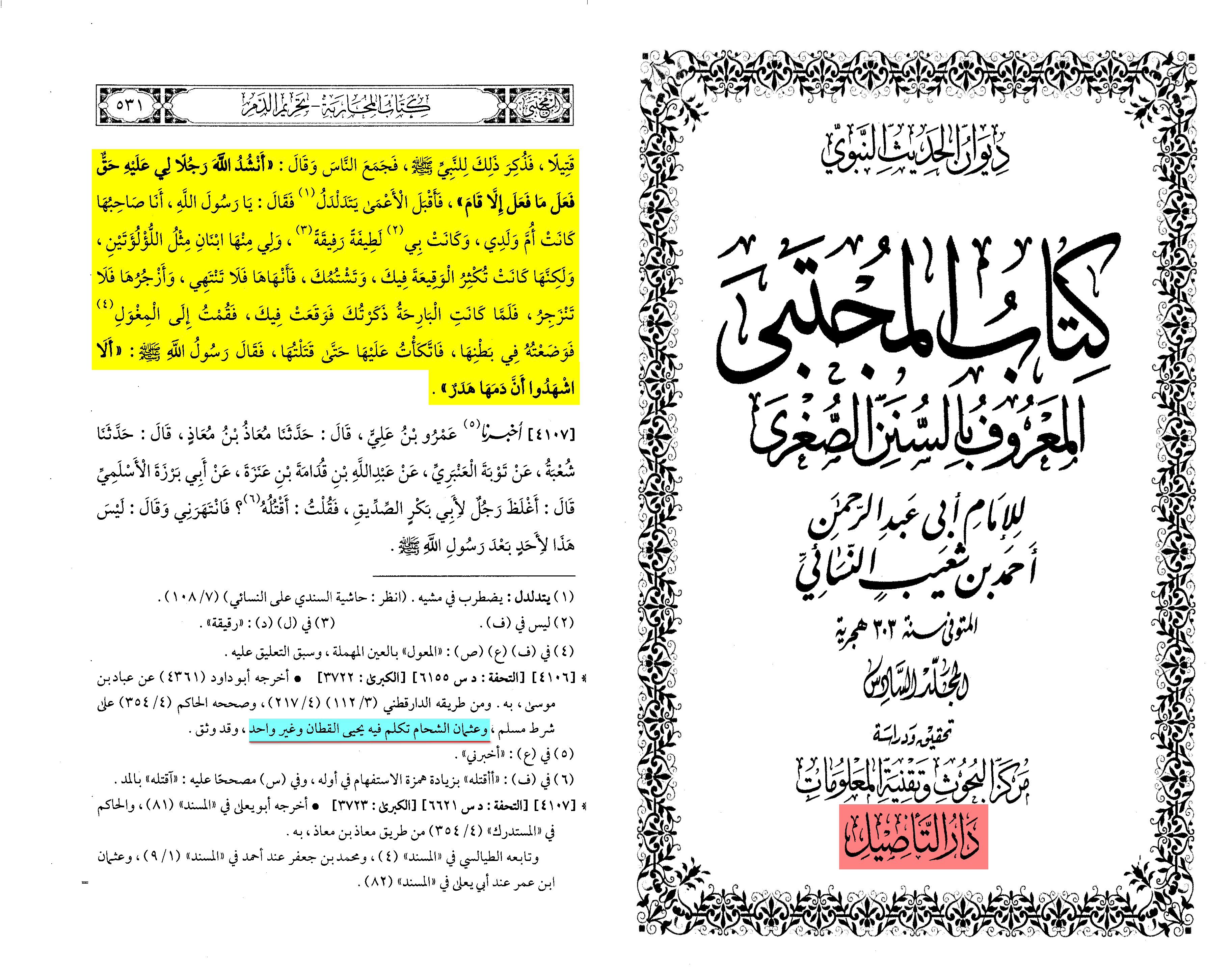
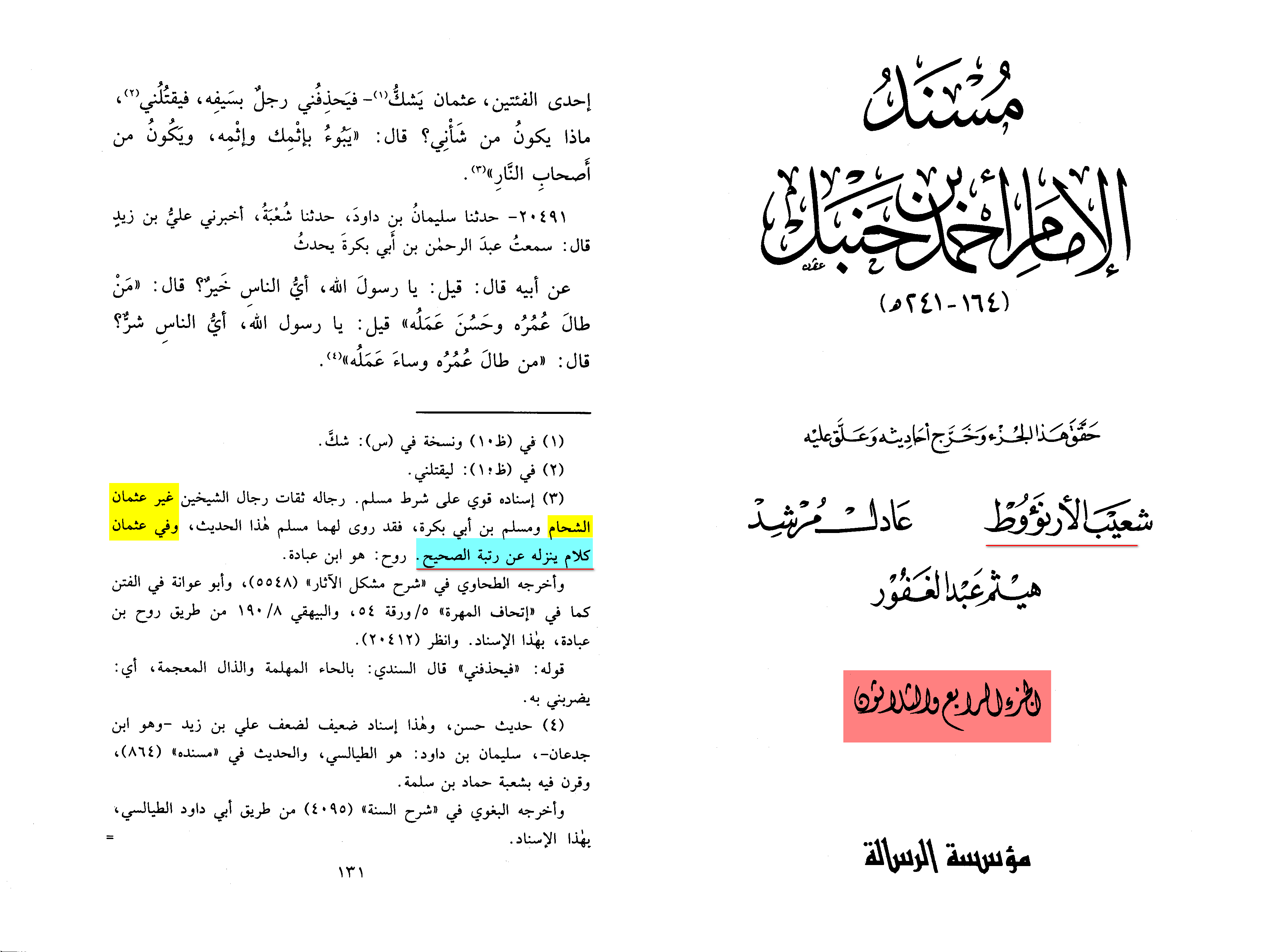
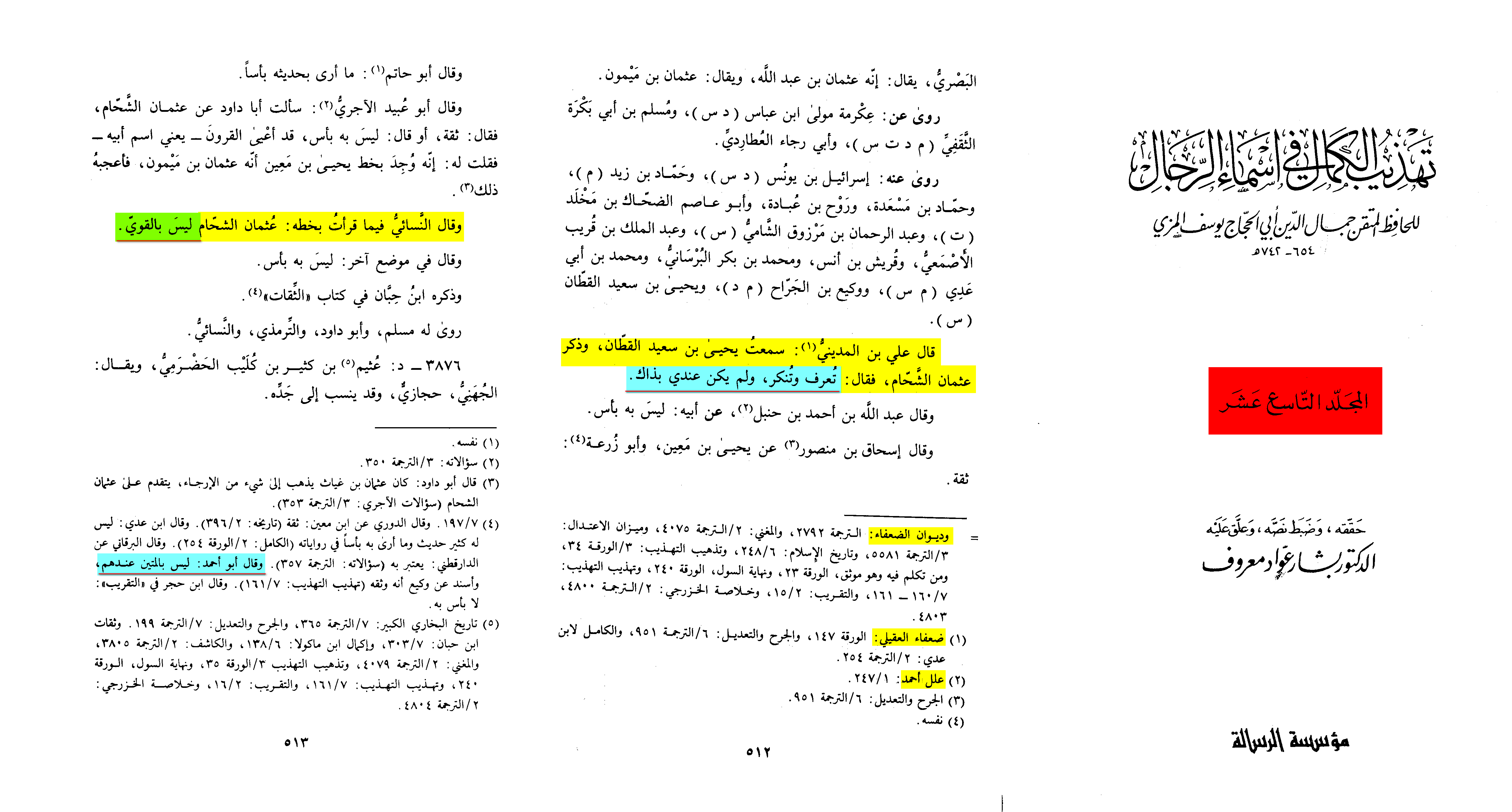
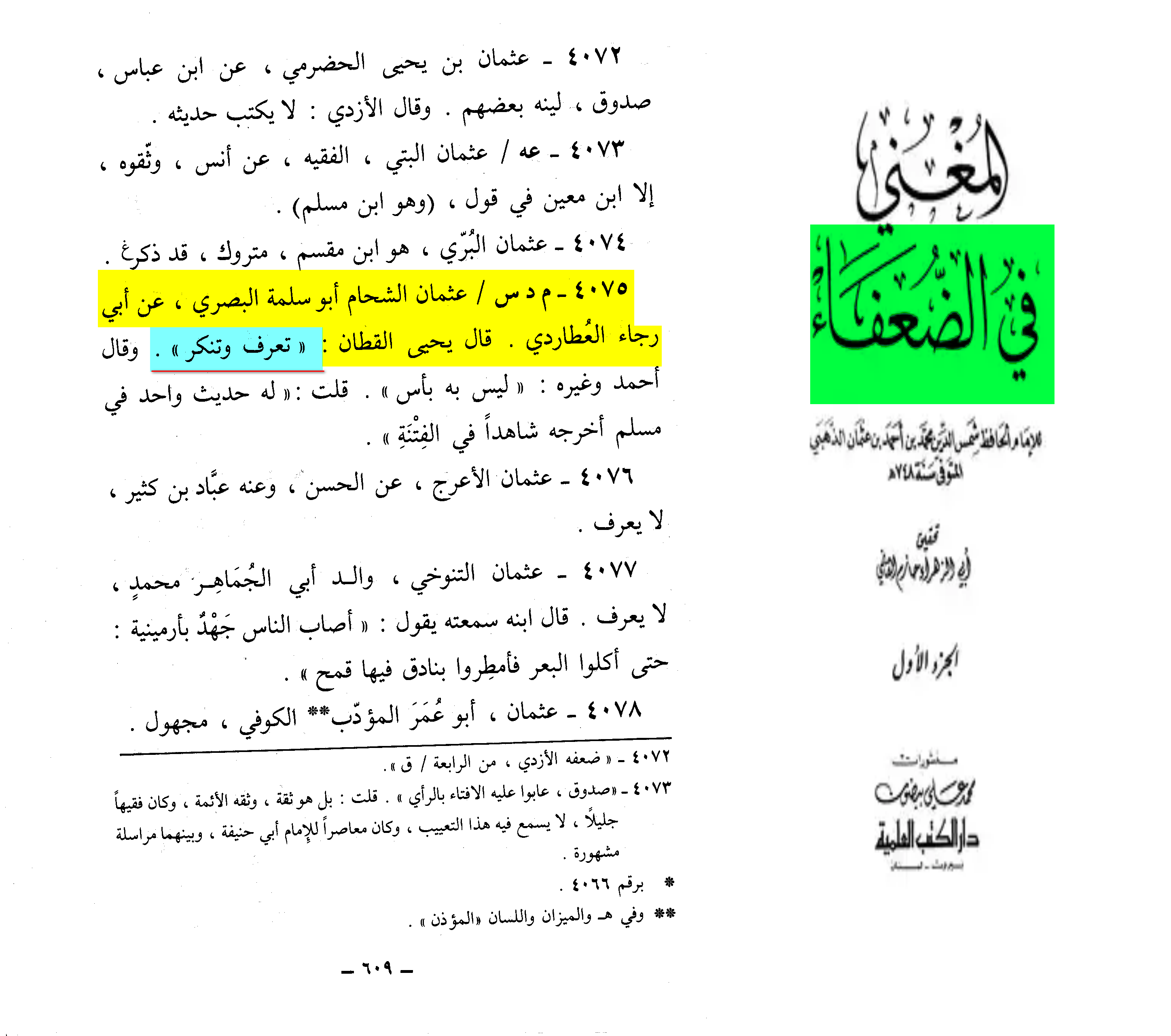
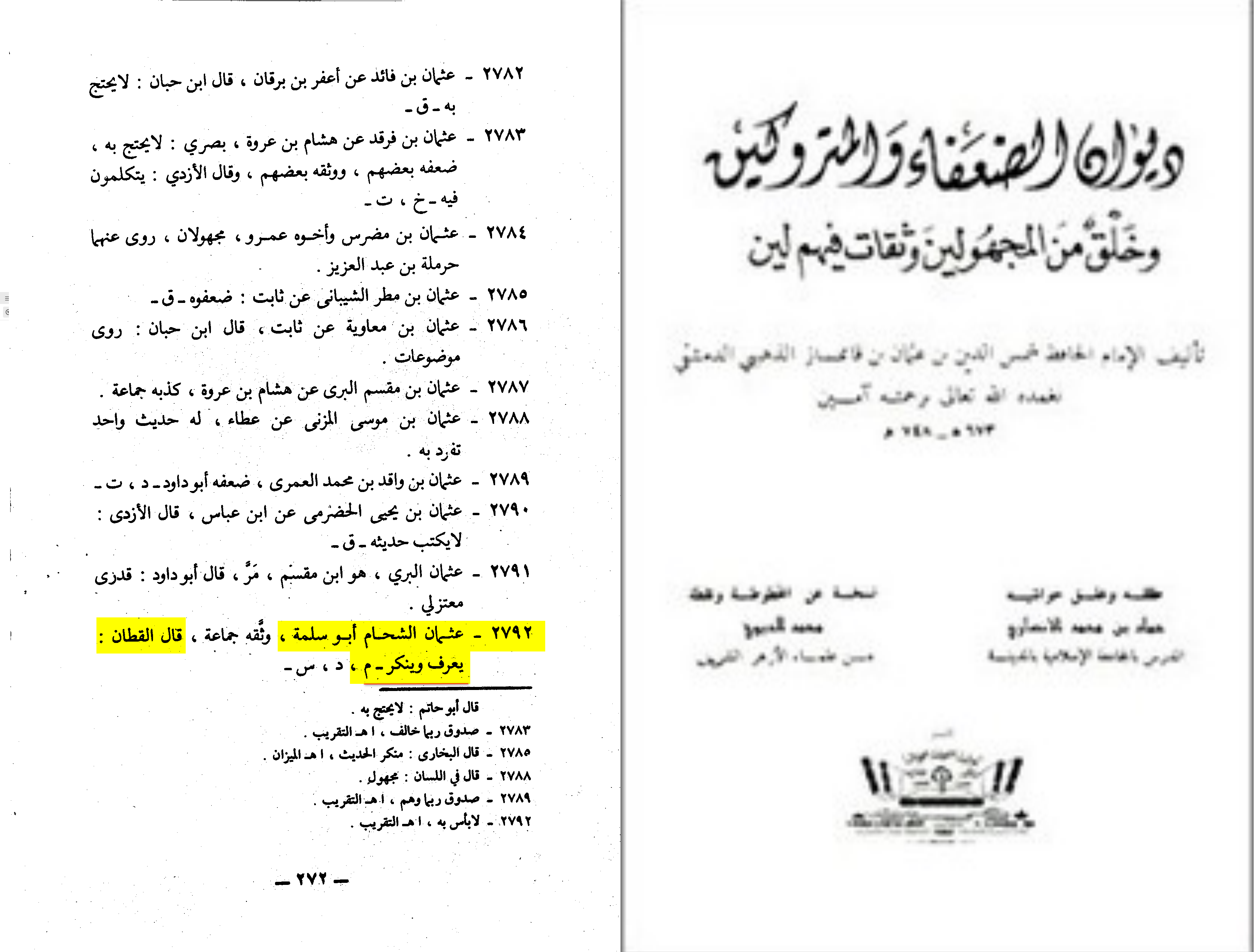 Ahmad ibn Muhammad al-Tahawi (d. 321 AH/933 CE). Mukhtasar Ikhtilaf al-Ulama, vol. 3, p. 504, #1652
قال أصحابنا فيمن سب النبي صلى الله عليه وسلم أو عابه وكان مسلما فقد صار مرتدا ولو كان ذميا عزر ولم يقتل
As for insult or reproach of the Prophet, our companions (the Hanafis) say: If he is a Muslim, then he has become an apostate, and if he is a dhimmi, then he is given a tazir, and not killed.
Ahmad ibn Ali al-Jassas (d. 370 AH/981 CE). Sharh Mukhtasar al-Tahawi fi al-Fiqh al-Hanafi, vol. 6, p. 142. See also Ahkam al-Quran, vol. 4, p. 275
فصل : حكم أهل الذمة في سب الرسول صلى الله عليه وسلم
قال أبو جعفر : ومَن كان من ذلك من أهل الذمة: فإنه يؤدَّب ولا يُقتل
لأنهم قد أُقِرُّوا على دينهم، ومِن دينهم عبادة غير الله، وتكذيب الرسول
ويدل عليه: ما روي «أنَّ اليهود دخلوا على النبي عليه الصلاة والسلام، فقالوا: السام عليك، فقال النبي صلى الله عليه وسلم: وعليكم»، ولم يوجد عليهم قتلا
Al-Tahawi said: Whoever insults the Prophet from the people of dhimma, he is chastised, and not killed.
This is because they have already assented to their religion, and from their religion is worship of other than Allah, and denial of the Messenger of Allah. This is evinced by what has been narrated: “The Jews entered upon the Prophet and said, ‘Death be upon you.’ The Prophet said, ‘And upon you.’”
And he did not rule they be killed.3
Ahmad ibn Muhammad al-Quduri (d. 428 AH/1036 CE). Al-Tajrid, vol. 12, p. 6266
أهل الذمة يسبون الله تعالى ويقولون له ولد ، والمجوس يقولون له ضِدٌ وهو أمر بَينِّ فلا ينقضون العهد بذلك ، فسب النبي مثله. ولأنه نوع كفر فلا ينقض بذلك العهد كسائر أنواعه ، لأنهم لو سبوا النبي في كنائسهم وبِيَعهم لم ينقضوا به العهد وما لا ينتقض العهد في كنائسهم لا ينتقض به غيرها كضرب الناقوس وإظهار الخنازير
The people of dhimma blaspheme against Allah by saying He has a son, and the Zoroastrians by saying He has an “opposite.” These are clear realities, and these (sayings) do not break their covenant (of security). So, insult of the Prophet is the same. Because, it is just one type of disbelief, so it does not break the covenant, in the same way the other types (of disbelief do not).
If they insult the Prophet in their churches, and in their transactions, it does not nullify their covenant. And what does not break their covenant in their churches, doesn’t break it it in other ways, such as in them ringing bells, or displaying pigs.
Masoud ibn Ahmad al-Kasani (d. 587 AH/1191 CE). Badai al-Sanai fi Tartib al-Sharai, vol. 15, p. 336
وكذلك لو سب النبي عليه الصلاة والسلام لا ينتقض عهده ؛ لأن هذا زيادة كفر على كفر ، والعهد يبقى مع أصل الكفر فيبقى مع الزيادة
If (a dhimmi) insults the Prophet, it does not invalidate his covenant (of security). Because, this is an addition to unbelief, upon unbelief. If the covenant was established upon the original unbelief, then it is established upon its addition.4
Ali ibn Zakariya al-Manjabi (d. 686 AH/1287 CE). Al-Lubab fi Jama Bayna al-Sunnah wa al-Kitab, vol. 2, p. 765
من أظهر سب النبي صلى الله عليه وسلم من أهل الذمة عزر ولا ينتقض عهده ولا يقتل
Whoever insults the Prophet from the people of dhimma, he is given a tazir, his covenant is not invalidated, and he is not killed.
Abu Bakr ibn Ali al-Haddad (d. 800 AH/1397 CE). Al-Jawhara al-Nayira ala Mukhtasar al-Quduri, vol. 6, p. 138
وأما سب النبي صلى الله عليه وسلم فلا يكون نقضا للعهد عندنا ؛ لأنه كفر والكفر المقارن له لا يمنعه فالطارئ لا يرفعه ولأن سب النبي صلى الله عليه وسلم يجري مجرى سب الله تعالى وهم يسبون الله تعالى فيقولون له ولد
As for insult of the Prophet (by a dhimmi), it does not invalidate their covenant according to us (the Hanafis). Because, this is unbelief; it does not nullify the covenant, and it is not lifted due to it. This is because blasphemy against the Prophet is synonymous with blasphemy against Allah, and they already blaspheme against Allah by saying He has a son.5
3. Versions of this story are found in all six primary books of Sunni hadith literature — including Sahih Bukhari and Sahih Muslim, and feature prominently in some of the Hanafi discussions on blasphemy.
This unique passage reinforces the Hanafi notion that blasphemy is a type of apostasy, and not a distinct offense. Rather than having left the religion (as might be evident if a Muslim blasphemes), non-Muslims inherently believe differently and do not recognize Muhammad as a prophet, and therefore cannot be punished for apostasy.
4. This reasoning eloquently demonstrates how the Hanafis envision apostasy and blasphemy to be synonymous. If one blasphemes, he has committed “unbelief.” How can a dhimmi be punished for uttering unbelief, when it is simply an addition to the inherent unbelief he possesses as a non-Muslim? If the covenant of security was established given their original religious unbelief, then it is not broken due to uttering something blasphemous — which is simply more unbelief on top of their original state of unbelief. This clearly articulates a methodological understanding distinct from the other madhabs, and distinguishes the Hanafis on this issue.
‘Abidin al-Shami has quoted from some Shafi’i scholars;
إذا ذكره بسوء يعتقده ويتدين به، بأن قال إنه ليس برسول أو قتل اليهود بغير حق أو نسبه إلى الكذب فعند بعض الأئمة لا ينتقض عهده أما إذا ذكره بما لا يعتقده ولا يتدين به كما لو نسبه إلى الزنا أو طعن في نسبه ينتقض.
If a non-Muslim mention the Prophet (ﷺ) in negative tone saying what is part of his religion like saying that he was not a Prophet or that he killed the Jews unjustly or that he made a false claim to Prophethood then to some of the scholars this does not break the covenant. As to mentioning him in a way that is not part of his religion or beliefs like attributing to him illicit sex or attacking his lineage then it does break the covenant. (Al-Shami, Ibn ‘Abidin, Radd al-Muhtar, Vol.4, 214)
Imam al-Madhari al-Hanafi (d. 1225 AH) states:
« Al-Baghawi said, "This is proof that if a person openly attacks Islam, they will no longer be considered a person of covenant." I reply: "This argument is weak because the condition is that both actions must be taken: to break the promise and to insult the religion. The verdict does not apply to only one of these actions (alone)." »
•📓 [Tafsir Al-Mazhari (4/129)]
Ahmad ibn Muhammad al-Tahawi (d. 321 AH/933 CE). Mukhtasar Ikhtilaf al-Ulama, vol. 3, p. 504, #1652
قال أصحابنا فيمن سب النبي صلى الله عليه وسلم أو عابه وكان مسلما فقد صار مرتدا ولو كان ذميا عزر ولم يقتل
As for insult or reproach of the Prophet, our companions (the Hanafis) say: If he is a Muslim, then he has become an apostate, and if he is a dhimmi, then he is given a tazir, and not killed.
Ahmad ibn Ali al-Jassas (d. 370 AH/981 CE). Sharh Mukhtasar al-Tahawi fi al-Fiqh al-Hanafi, vol. 6, p. 142. See also Ahkam al-Quran, vol. 4, p. 275
فصل : حكم أهل الذمة في سب الرسول صلى الله عليه وسلم
قال أبو جعفر : ومَن كان من ذلك من أهل الذمة: فإنه يؤدَّب ولا يُقتل
لأنهم قد أُقِرُّوا على دينهم، ومِن دينهم عبادة غير الله، وتكذيب الرسول
ويدل عليه: ما روي «أنَّ اليهود دخلوا على النبي عليه الصلاة والسلام، فقالوا: السام عليك، فقال النبي صلى الله عليه وسلم: وعليكم»، ولم يوجد عليهم قتلا
Al-Tahawi said: Whoever insults the Prophet from the people of dhimma, he is chastised, and not killed.
This is because they have already assented to their religion, and from their religion is worship of other than Allah, and denial of the Messenger of Allah. This is evinced by what has been narrated: “The Jews entered upon the Prophet and said, ‘Death be upon you.’ The Prophet said, ‘And upon you.’”
And he did not rule they be killed.3
Ahmad ibn Muhammad al-Quduri (d. 428 AH/1036 CE). Al-Tajrid, vol. 12, p. 6266
أهل الذمة يسبون الله تعالى ويقولون له ولد ، والمجوس يقولون له ضِدٌ وهو أمر بَينِّ فلا ينقضون العهد بذلك ، فسب النبي مثله. ولأنه نوع كفر فلا ينقض بذلك العهد كسائر أنواعه ، لأنهم لو سبوا النبي في كنائسهم وبِيَعهم لم ينقضوا به العهد وما لا ينتقض العهد في كنائسهم لا ينتقض به غيرها كضرب الناقوس وإظهار الخنازير
The people of dhimma blaspheme against Allah by saying He has a son, and the Zoroastrians by saying He has an “opposite.” These are clear realities, and these (sayings) do not break their covenant (of security). So, insult of the Prophet is the same. Because, it is just one type of disbelief, so it does not break the covenant, in the same way the other types (of disbelief do not).
If they insult the Prophet in their churches, and in their transactions, it does not nullify their covenant. And what does not break their covenant in their churches, doesn’t break it it in other ways, such as in them ringing bells, or displaying pigs.
Masoud ibn Ahmad al-Kasani (d. 587 AH/1191 CE). Badai al-Sanai fi Tartib al-Sharai, vol. 15, p. 336
وكذلك لو سب النبي عليه الصلاة والسلام لا ينتقض عهده ؛ لأن هذا زيادة كفر على كفر ، والعهد يبقى مع أصل الكفر فيبقى مع الزيادة
If (a dhimmi) insults the Prophet, it does not invalidate his covenant (of security). Because, this is an addition to unbelief, upon unbelief. If the covenant was established upon the original unbelief, then it is established upon its addition.4
Ali ibn Zakariya al-Manjabi (d. 686 AH/1287 CE). Al-Lubab fi Jama Bayna al-Sunnah wa al-Kitab, vol. 2, p. 765
من أظهر سب النبي صلى الله عليه وسلم من أهل الذمة عزر ولا ينتقض عهده ولا يقتل
Whoever insults the Prophet from the people of dhimma, he is given a tazir, his covenant is not invalidated, and he is not killed.
Abu Bakr ibn Ali al-Haddad (d. 800 AH/1397 CE). Al-Jawhara al-Nayira ala Mukhtasar al-Quduri, vol. 6, p. 138
وأما سب النبي صلى الله عليه وسلم فلا يكون نقضا للعهد عندنا ؛ لأنه كفر والكفر المقارن له لا يمنعه فالطارئ لا يرفعه ولأن سب النبي صلى الله عليه وسلم يجري مجرى سب الله تعالى وهم يسبون الله تعالى فيقولون له ولد
As for insult of the Prophet (by a dhimmi), it does not invalidate their covenant according to us (the Hanafis). Because, this is unbelief; it does not nullify the covenant, and it is not lifted due to it. This is because blasphemy against the Prophet is synonymous with blasphemy against Allah, and they already blaspheme against Allah by saying He has a son.5
3. Versions of this story are found in all six primary books of Sunni hadith literature — including Sahih Bukhari and Sahih Muslim, and feature prominently in some of the Hanafi discussions on blasphemy.
This unique passage reinforces the Hanafi notion that blasphemy is a type of apostasy, and not a distinct offense. Rather than having left the religion (as might be evident if a Muslim blasphemes), non-Muslims inherently believe differently and do not recognize Muhammad as a prophet, and therefore cannot be punished for apostasy.
4. This reasoning eloquently demonstrates how the Hanafis envision apostasy and blasphemy to be synonymous. If one blasphemes, he has committed “unbelief.” How can a dhimmi be punished for uttering unbelief, when it is simply an addition to the inherent unbelief he possesses as a non-Muslim? If the covenant of security was established given their original religious unbelief, then it is not broken due to uttering something blasphemous — which is simply more unbelief on top of their original state of unbelief. This clearly articulates a methodological understanding distinct from the other madhabs, and distinguishes the Hanafis on this issue.
‘Abidin al-Shami has quoted from some Shafi’i scholars;
إذا ذكره بسوء يعتقده ويتدين به، بأن قال إنه ليس برسول أو قتل اليهود بغير حق أو نسبه إلى الكذب فعند بعض الأئمة لا ينتقض عهده أما إذا ذكره بما لا يعتقده ولا يتدين به كما لو نسبه إلى الزنا أو طعن في نسبه ينتقض.
If a non-Muslim mention the Prophet (ﷺ) in negative tone saying what is part of his religion like saying that he was not a Prophet or that he killed the Jews unjustly or that he made a false claim to Prophethood then to some of the scholars this does not break the covenant. As to mentioning him in a way that is not part of his religion or beliefs like attributing to him illicit sex or attacking his lineage then it does break the covenant. (Al-Shami, Ibn ‘Abidin, Radd al-Muhtar, Vol.4, 214)
Imam al-Madhari al-Hanafi (d. 1225 AH) states:
« Al-Baghawi said, "This is proof that if a person openly attacks Islam, they will no longer be considered a person of covenant." I reply: "This argument is weak because the condition is that both actions must be taken: to break the promise and to insult the religion. The verdict does not apply to only one of these actions (alone)." »
•📓 [Tafsir Al-Mazhari (4/129)]
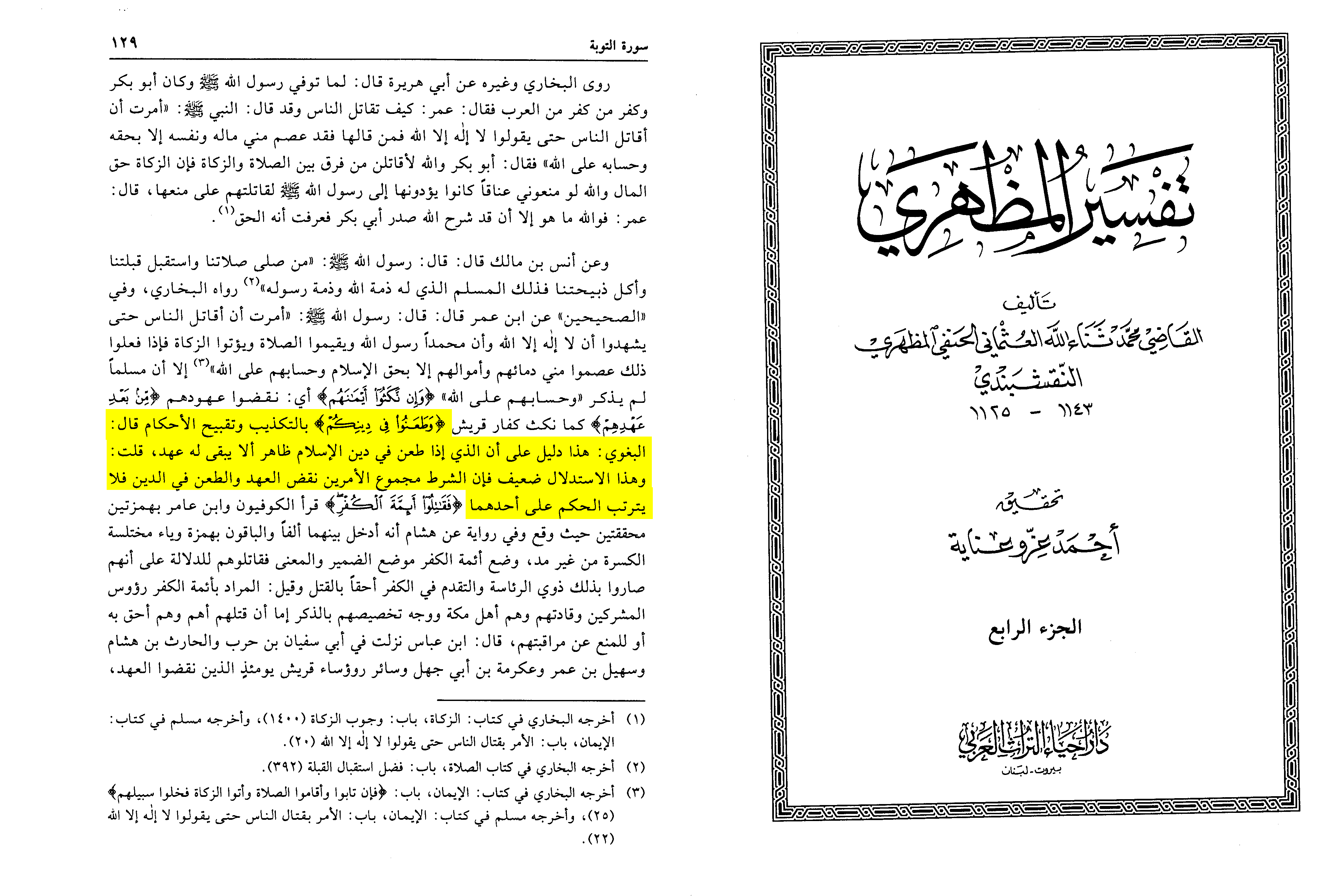 Other hadith used
From Abdullah bin Umar:] A man who insulted the Prophet ﷺ was brought to Umar, and he killed him, then he said: Whoever insults Allah or any of the Prophets, kill him.
This statement is recorded in Dhuhrat Al-Hifadh by Ibn Al-Qaisarani (d. 507 AH), 1/215, and it is considered weak. Ibn Adi also recorded it in "Al-Kamil Fi Al-Du'afa" 5/372.
2- [Narrated by Abdullah bin Umar:] Whoever insults Allah or any of the prophets, then kill him.
Ibn Hajar Al-Asqalani (d. 852), Lisan Al-Mizan 5/439 • [It contains] Asma bin Mohammad's immunity. Al-Aqeeli said: His hadith shouldn’t be written down except with supported evidences.
Ibn Kathir and Ibn Battal explaining how Ka'b al Ashraf was an enemy of the Prophet ﷺ, often abusing the Prophet ﷺ in his poetry and inciting the polytheists to fight the Muslims:
Other hadith used
From Abdullah bin Umar:] A man who insulted the Prophet ﷺ was brought to Umar, and he killed him, then he said: Whoever insults Allah or any of the Prophets, kill him.
This statement is recorded in Dhuhrat Al-Hifadh by Ibn Al-Qaisarani (d. 507 AH), 1/215, and it is considered weak. Ibn Adi also recorded it in "Al-Kamil Fi Al-Du'afa" 5/372.
2- [Narrated by Abdullah bin Umar:] Whoever insults Allah or any of the prophets, then kill him.
Ibn Hajar Al-Asqalani (d. 852), Lisan Al-Mizan 5/439 • [It contains] Asma bin Mohammad's immunity. Al-Aqeeli said: His hadith shouldn’t be written down except with supported evidences.
Ibn Kathir and Ibn Battal explaining how Ka'b al Ashraf was an enemy of the Prophet ﷺ, often abusing the Prophet ﷺ in his poetry and inciting the polytheists to fight the Muslims:
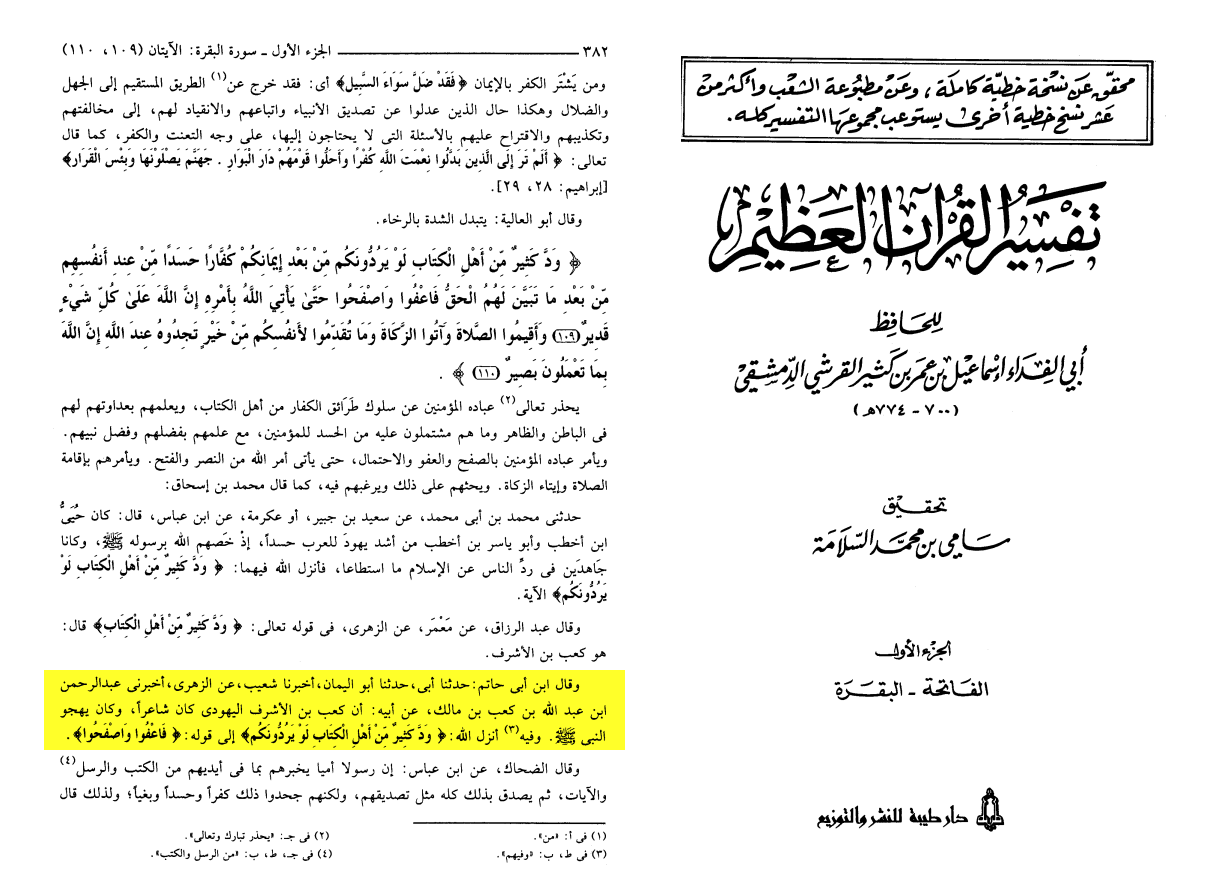
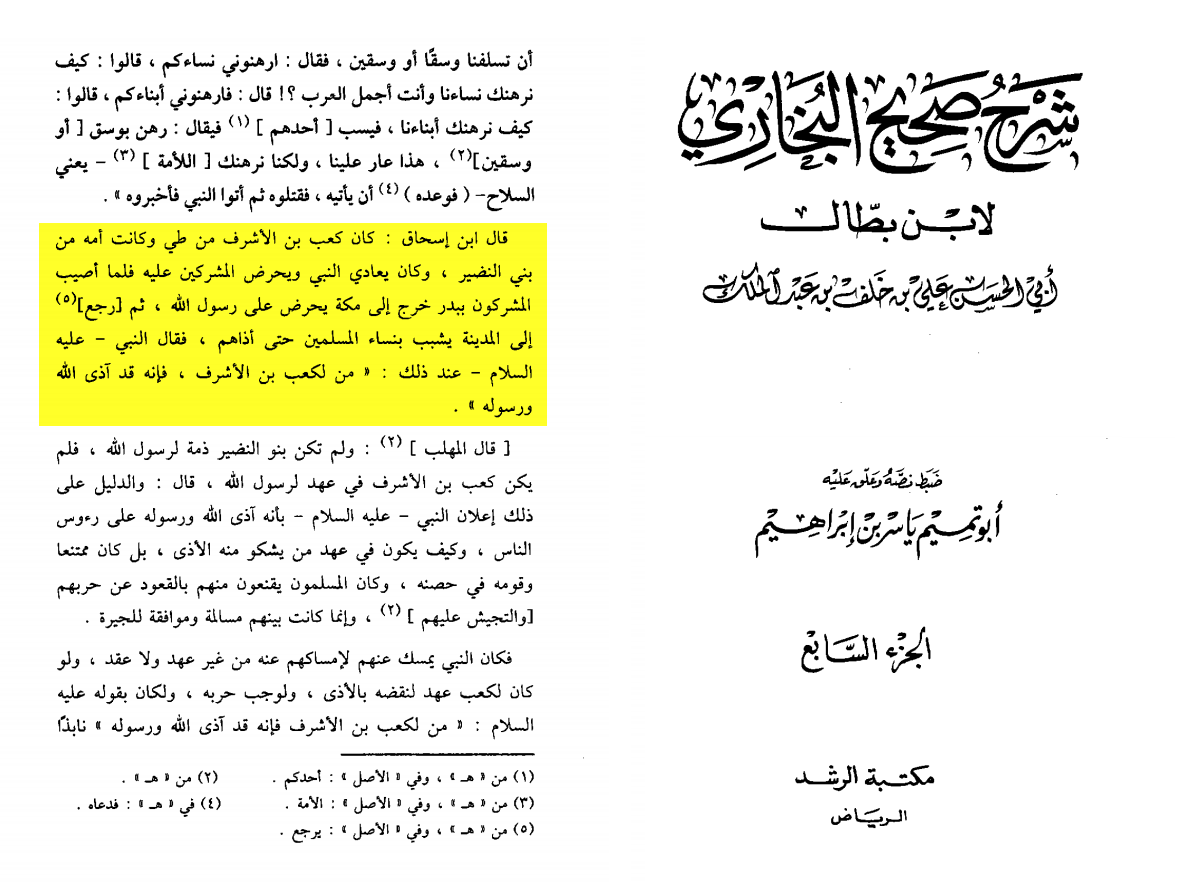


 And Al-Mughaltay writes:
وقال أبو أحمد الحاكم عثمان بن مسلم أبو سلمة الشحام ليس بالمتين عندهم
Abu Ahmad al-Hakim said Uthman ibn Muslim, Abu Salamah, is not solid in their view.
Source: Ikmāl Tahdhīb al-Kamāl 9/194
And Ibn Hajar writes:
وكذا أبو أحمد وقال ليس بالمتين عندهم وقال الدارقطني بصري يعتبر به
Likewise was said by Abu Ahmad that he is not solid in their view. Al-Daraqutni said he is a Basran in need of further consideration.
Source: Tahdhīb al-Tahdhīb 7/161
And Al-Arna’ut writes:
وفي عثمان كلام ينزله عن رتبة الصحيح
There is a discussion on Uthman about lowering him from the level of soundness.
Source: Takhrīj al-Musnad 34/131
Ibn ‘Adi also mentioned him in his book of weak narrators, although he did not consider him weak per se, writing:
عُثْمَانُ الشَّحَّامُ لَيْسَ لَهُ كَثِيرُ حَدِيثٍ وَمَا رَأَى بِهِ بَأْسًا فِي رِوَايَاتِهِ
Uthman al-Shuhham does not have many traditions, but there is no objection seen in his narrations.
Source: al-Kāmil fī Ḍuʻafā’ al-Rijāl 6/293
However, just because Ibn ‘Adi saw nothing wrong in his narrations does not mean he considered him above scrutiny.
Imam Muslim included only one narration of Uthman al-Shuhham from Muslim ibn Abi Bakrah in his Sahih collection. This indicates that Imam Muslim considered his chain from Ibn Abi Bakrah to be authentic, but he did not narrate his chain from ‘Ikramah. Thus, the presence of Uthman al-Shuhham in the Sahih does not mean every narration from him was considered authentic by Imam Muslim.
Hence, the problematic hadith of the blind man is based on the authority of a questionable narrator, who narrated an unusually small number of hadith, who was criticized and rejected by some scholars, and whose narrations are otherwise not widely-regarded as legal evidence. On this basis alone, Muslims are not required at all to accept the authenticity of the story or the legal ruling it supports.
If, for the sake of argument, Uthman al-Shuhham’s chain from ‘Ikramah is sound and the story is true, there are certainly missing details from the text that are needed to properly contextualize it. An anomalous (shadh) narration cannot overrule many more verses of the Quran and authentic hadith.
It is a well-established rule in Islam that legal punishments such as executions, flogging, or imprisonment can only be carried out by executive authorities.
And Al-Mughaltay writes:
وقال أبو أحمد الحاكم عثمان بن مسلم أبو سلمة الشحام ليس بالمتين عندهم
Abu Ahmad al-Hakim said Uthman ibn Muslim, Abu Salamah, is not solid in their view.
Source: Ikmāl Tahdhīb al-Kamāl 9/194
And Ibn Hajar writes:
وكذا أبو أحمد وقال ليس بالمتين عندهم وقال الدارقطني بصري يعتبر به
Likewise was said by Abu Ahmad that he is not solid in their view. Al-Daraqutni said he is a Basran in need of further consideration.
Source: Tahdhīb al-Tahdhīb 7/161
And Al-Arna’ut writes:
وفي عثمان كلام ينزله عن رتبة الصحيح
There is a discussion on Uthman about lowering him from the level of soundness.
Source: Takhrīj al-Musnad 34/131
Ibn ‘Adi also mentioned him in his book of weak narrators, although he did not consider him weak per se, writing:
عُثْمَانُ الشَّحَّامُ لَيْسَ لَهُ كَثِيرُ حَدِيثٍ وَمَا رَأَى بِهِ بَأْسًا فِي رِوَايَاتِهِ
Uthman al-Shuhham does not have many traditions, but there is no objection seen in his narrations.
Source: al-Kāmil fī Ḍuʻafā’ al-Rijāl 6/293
However, just because Ibn ‘Adi saw nothing wrong in his narrations does not mean he considered him above scrutiny.
Imam Muslim included only one narration of Uthman al-Shuhham from Muslim ibn Abi Bakrah in his Sahih collection. This indicates that Imam Muslim considered his chain from Ibn Abi Bakrah to be authentic, but he did not narrate his chain from ‘Ikramah. Thus, the presence of Uthman al-Shuhham in the Sahih does not mean every narration from him was considered authentic by Imam Muslim.
Hence, the problematic hadith of the blind man is based on the authority of a questionable narrator, who narrated an unusually small number of hadith, who was criticized and rejected by some scholars, and whose narrations are otherwise not widely-regarded as legal evidence. On this basis alone, Muslims are not required at all to accept the authenticity of the story or the legal ruling it supports.
If, for the sake of argument, Uthman al-Shuhham’s chain from ‘Ikramah is sound and the story is true, there are certainly missing details from the text that are needed to properly contextualize it. An anomalous (shadh) narration cannot overrule many more verses of the Quran and authentic hadith.
It is a well-established rule in Islam that legal punishments such as executions, flogging, or imprisonment can only be carried out by executive authorities.

 Ibn Muflih writes:
تَحْرُمُ إقَامَةُ حَدٍّ إلَّا لِإِمَامٍ أَوْ نَائِبِهِ
It is forbidden to establish a legal punishment unless it is done by the leader or his deputy.
Source: al-Furū’ wa Taṣḥīḥ al-Furū’ 10/29
And according to the Kuwaiti Encyclopedia of Fiqh:
اتَّفَقَ الْفُقَهَاءُ عَلَى أَنَّهُ لاَ يُقِيمُ الْحَدَّ إلا الإمام أَوْ نَائِبُهُ وَذَلِكَ لِمَصْلَحَةِ الْعِبَادِ وَهِيَ صِيَانَةُ أَنْفُسِهِمْ وَأَمْوَالِهِمْ وَأَعْرَاضِهِمْ
The jurists came to a consensus that a legal punishment may not be implemented unless by the leader or his deputy. That is in the best interest of people, which is to safeguard their lives, their property, and their reputations.
Source: al-Mawsū’at al-Fiqhīyah al-Kuwaytīyah 17/144
This principle, known in the West as due process, is essential to civil society. Citing the hadith of the blind man to circumvent it is a very dangerous proposition.
If the incident did in fact occur, then the slander (waqi’) and disparagement (shatm) committed by the woman must have been done in manner that was aiding or inciting enemy forces, as the Muslims in Medina at the time were fighting a defensive war against the idolaters of Mecca.
Ibn Taymiyyah considered the possibility of this interpretation, writing:
الوجه الثالث أن هذا وإن كان حدا فهو قتل حربي أيضا فصار بمنزلة قتل حربي تحتم قتله وهذا يجوز قتله لكل أحد
A third view is that, if this was a legal punishment, then it was also the killing of a combatant. Thus, she had the status of an enemy combatant who must be killed. This type of killing is permissible for anyone.
Source: al-Ṣārim al-Maslūl 1/286
The Prophet (ṣ) did not kill people just for insulting him. Many people insulted him, cursed him, and harmed him, yet he was forgiving, patient, and forbearing. The legal maxim of no-harm requires that one can only harm others if it is necessary to avoid a greater harm.
The Prophet (ṣ) also would not have allowed a man to designate himself as judge, jury, and executioner. If the Prophet (ṣ) did in fact pardon the man for killing his concubine, it could only have been in such a case that she was aiding or inciting the enemy. No one needs permission from authorities to fight or kill someone who is waging war against them.
As for the legal implications of the hadith – the context in which it is usually cited – is it really necessary in Islam to punish blasphemers with death?
Al-San’ani commented on the hadith of the blind man specifically, writing:
فَإِنْ كَانَ مُسْلِمًا كَانَ سَبُّهُ لَهُ صَلَّى اللَّهُ عَلَيْهِ وَسَلَّمَ رِدَّةً … وَنَقَلَ ابْنُ الْمُنْذِرِ عَنْ الْأَوْزَاعِيِّ وَاللَّيْثِ أَنَّهُ يُسْتَتَابُ
If it was a Muslim who cursed the Prophet (ṣ) as an act of apostasy… it has been transmitted by Ibn al-Mundhir from Al-Awza’i and Al-Layth that they should be imprisoned until they repent.
Source: Subul al-Salām 2/384
Blasphemy committed by a Muslim, in the eyes of the jurists, was equal to treason or sedition, that is, incitement to violently overthrow the social order established upon Islamic law. However, some scholars, including the Caliph Umar (ra), lightened the sentence of apostasy in certain situations.
Anas ibn Malik reported: I said, “O commander of the faithful, some people have turned renegade against Islam and joined the idolaters. What is to be done to them other than killing?” Umar ibn al-Khattab, may Allah be pleased with him, said:
لَأَنْ أَكُونَ أَخَذْتُهُمْ سِلْمًا أَحَبُّ إِلَيَّ مِمَّا طَلَعَتْ عَلَيْهِ الشَّمْسُ مِنْ صَفْرَاءَ أَوْ بَيْضَاءَ
That I take hold of them on peaceful terms is more beloved to me than everything over which the sun rises, from the horizon to the zenith.
I said, “O commander of the faithful, what would you do if you took hold of them?” Umar said:
كُنْتُ عَارِضًا عَلَيْهِمُ الْبَابَ الَّذِي خَرَجُوا مِنْهُ أَنْ يَدْخُلُوا فِيهِ فَإِنْ فَعَلُوا ذَلِكَ قَبِلْتُ مِنْهُمْ وَإِلَّا اسْتَوْدَعْتُهُمُ السِّجْنَ
I would offer them the door through which they exited, that they would enter it again. If they did so, I would accept it from them; otherwise I would keep them in prison.
Source: Muṣannaf ‘Abd al-Razzāq 18696, Grade: Sahih
Ma’mar reported: Some residents of the peninsula told me that some people had embraced Islam, but it was not long until they became apostates. Maymun ibn Mihran wrote to Umar Ibn Abdul Aziz, may Allah have mercy on him, regarding them and Umar wrote back saying:
رُدَّ عَلَيْهِمُ الْجِزْيَةَ وَدَعْهُمْ
Let them return to paying tribute and leave them alone.
Source: Muṣannaf ‘Abd al-Razzāq 18102
‘Amr ibn Qays reported: Ibrahim al-Nakha’i, may Allah have mercy on him, said:
الْمُرْتَدّ يُسْتَتَابُ أَبَدًا
The apostate is imprisoned indefinitely until he repents.
And Sufyan al-Thawri said:
هَذَا الَّذِي نَأْخُذُ بِهِ
This is what we adhere to.
Source: Muṣannaf ‘Abd al-Razzāq 18697
Abu Razin reported: Ibn Abbas, may Allah be pleased with him, said:
تُحْبَسُ وَلَا تُقْتَلُ الْمَرْأَةُ تَرْتَدُّ
The female apostate is imprisoned and is not killed for her apostasy.
Source: Muṣannaf ‘Abd al-Razzāq 18731
Al-Layth reported: ‘Ata’, may Allah have mercy on him, said:
الْمُرْتَدَّةِ لَا تُقْتَلُ
The female apostate is not killed.
Source: Muṣannaf Ibn Abī Shaybah 28995
Abu Harrah reported: Al-Hasan, may Allah have mercy on him, said:
الْمَرْأَةِ تَرْتَدُّ عَنِ الْإِسْلَامِ لَا تُقْتَلُ تُحْبَسُ
The woman who renegades against Islam is not killed. She is imprisoned.
Source: Muṣannaf Ibn Abī Shaybah 28997
There was no absolute consensus that the death penalty was mandated in every case of apostasy or blasphemy, which indicates that it is more likely subject to discretionary punishment (ta’zir). The authorities can lighten the sentence if this is in the best interests of Muslim society and achieves the objectives of Islamic law, one of which is mercy for the creation.
Ibrahim al-Nakha’i said specifically in the context of apostasy:
ادْرَءُوا الْحُدُودَ عَنِ الْمُسْلِمِينَ مَا اسْتَطَعْتُمْ فَإِذَا وَجَدْتُمْ لِلْمُسْلِمِ مَخْرَجًا فَادْرَءُوا عَنْهُ فَإِنَّهُ أَنْ يَخْطَأَ حَاكِمٌ مِنْ حُكَّامِ الْمُسْلِمِينَ فِي الْعَفْوِ خَيْرٌ مِنْ أَنْ يَخْطَأَ فِي الْعُقُوبَةِ
Avoid legal punishments upon the Muslims as much as you can. If you find a way out for a Muslim, leave him to his way. For a Muslim judge to err in pardoning the criminal is better than to err in punishing him.
Source: Muṣannaf ‘Abd al-Razzāq 18698
If blasphemy was committed by a non-Muslim, the jurists also did not agree that the death penalty was mandatory. Al-San’ani continues:
وَعَنْ الْحَنَفِيَّةِ أَنَّهُ يُعَزَّرُ الْمُعَاهَدُ ولا يقتل واحتج الطحاوي بأنه صلى الله عليه وسلم لم يقتل اليهود الذي قالوا السام عليك
It is narrated from the Hanafi scholars that the covenanted person is given a discretionary punishment and is not killed. Al-Tahawi cited as evidence that the Prophet (s) did not kill the Jews who came to him and they said (in a play on words): Death be upon you!
Source: Subul al-Salam 2/385
Indeed, one can find many instances in the biography of the Prophet (ṣ) when he was merciful, forgiving, and patient with those who directly insulted him.
Aisha reported: A group of Jews asked permission to visit the Prophet and when they were admitted, they said, “Death be upon you!” I said to them, “Rather, death and the curse of Allah be upon you!” The Prophet, peace and blessings be upon him, said:
يَا عَائِشَةُ إِنَّ اللَّهَ رَفِيقٌ يُحِبُّ الرِّفْقَ فِي الْأَمْرِ كُلِّهِ
O Aisha, Allah is gentle and he loves gentleness in all matters.
Source: Ṣaḥīḥ al-Bukhārī 6528, Grade: Muttafaqun Alayhi
In another narration, the Prophet (ṣ) said:
يَا عَائِشَةُ عَلَيْكِ بِالرِّفْقِ وَإِيَّاكِ وَالْعُنْفَ وَالْفُحْشَ
O Aisha, you must be gentle and beware of harsh and profane words.
Source: Ṣaḥīḥ al-Bukhārī 5683, Grade: Sahih
Mercy and patience with blasphemy was the general rule applied by the Prophet (ṣ), while legal punishment was the exception only when it was compounded by high crimes of apostasy, treason, warfare, sedition, or incitement.
In sum, the hadith of the blind man summarily killing his concubine without due process is a weak narration due to the doubtfulness of Uthman al-Shuhham. If the incident really did take place, then it can only be interpreted in accordance with moral and legal principles established by an enormity of other sound texts. No one may carry out legal punishments without properly constituted authority, and blasphemy by itself is not punishable with death.
Success comes from Allah, and Allah knows best.
Now lets talk about kaab bin Al-abhar
First off he used to persue Quraish to kill the prophet and fight him
Translation: “He cursed the prophet and his companions in his poems and he gets Quraish and keeps persuading them in fighting him and killing him”
-Source: Sharh Sunan Abi dawud ibn ruslan volume 13 page number 21 explaining narration number 3000
Ibn Muflih writes:
تَحْرُمُ إقَامَةُ حَدٍّ إلَّا لِإِمَامٍ أَوْ نَائِبِهِ
It is forbidden to establish a legal punishment unless it is done by the leader or his deputy.
Source: al-Furū’ wa Taṣḥīḥ al-Furū’ 10/29
And according to the Kuwaiti Encyclopedia of Fiqh:
اتَّفَقَ الْفُقَهَاءُ عَلَى أَنَّهُ لاَ يُقِيمُ الْحَدَّ إلا الإمام أَوْ نَائِبُهُ وَذَلِكَ لِمَصْلَحَةِ الْعِبَادِ وَهِيَ صِيَانَةُ أَنْفُسِهِمْ وَأَمْوَالِهِمْ وَأَعْرَاضِهِمْ
The jurists came to a consensus that a legal punishment may not be implemented unless by the leader or his deputy. That is in the best interest of people, which is to safeguard their lives, their property, and their reputations.
Source: al-Mawsū’at al-Fiqhīyah al-Kuwaytīyah 17/144
This principle, known in the West as due process, is essential to civil society. Citing the hadith of the blind man to circumvent it is a very dangerous proposition.
If the incident did in fact occur, then the slander (waqi’) and disparagement (shatm) committed by the woman must have been done in manner that was aiding or inciting enemy forces, as the Muslims in Medina at the time were fighting a defensive war against the idolaters of Mecca.
Ibn Taymiyyah considered the possibility of this interpretation, writing:
الوجه الثالث أن هذا وإن كان حدا فهو قتل حربي أيضا فصار بمنزلة قتل حربي تحتم قتله وهذا يجوز قتله لكل أحد
A third view is that, if this was a legal punishment, then it was also the killing of a combatant. Thus, she had the status of an enemy combatant who must be killed. This type of killing is permissible for anyone.
Source: al-Ṣārim al-Maslūl 1/286
The Prophet (ṣ) did not kill people just for insulting him. Many people insulted him, cursed him, and harmed him, yet he was forgiving, patient, and forbearing. The legal maxim of no-harm requires that one can only harm others if it is necessary to avoid a greater harm.
The Prophet (ṣ) also would not have allowed a man to designate himself as judge, jury, and executioner. If the Prophet (ṣ) did in fact pardon the man for killing his concubine, it could only have been in such a case that she was aiding or inciting the enemy. No one needs permission from authorities to fight or kill someone who is waging war against them.
As for the legal implications of the hadith – the context in which it is usually cited – is it really necessary in Islam to punish blasphemers with death?
Al-San’ani commented on the hadith of the blind man specifically, writing:
فَإِنْ كَانَ مُسْلِمًا كَانَ سَبُّهُ لَهُ صَلَّى اللَّهُ عَلَيْهِ وَسَلَّمَ رِدَّةً … وَنَقَلَ ابْنُ الْمُنْذِرِ عَنْ الْأَوْزَاعِيِّ وَاللَّيْثِ أَنَّهُ يُسْتَتَابُ
If it was a Muslim who cursed the Prophet (ṣ) as an act of apostasy… it has been transmitted by Ibn al-Mundhir from Al-Awza’i and Al-Layth that they should be imprisoned until they repent.
Source: Subul al-Salām 2/384
Blasphemy committed by a Muslim, in the eyes of the jurists, was equal to treason or sedition, that is, incitement to violently overthrow the social order established upon Islamic law. However, some scholars, including the Caliph Umar (ra), lightened the sentence of apostasy in certain situations.
Anas ibn Malik reported: I said, “O commander of the faithful, some people have turned renegade against Islam and joined the idolaters. What is to be done to them other than killing?” Umar ibn al-Khattab, may Allah be pleased with him, said:
لَأَنْ أَكُونَ أَخَذْتُهُمْ سِلْمًا أَحَبُّ إِلَيَّ مِمَّا طَلَعَتْ عَلَيْهِ الشَّمْسُ مِنْ صَفْرَاءَ أَوْ بَيْضَاءَ
That I take hold of them on peaceful terms is more beloved to me than everything over which the sun rises, from the horizon to the zenith.
I said, “O commander of the faithful, what would you do if you took hold of them?” Umar said:
كُنْتُ عَارِضًا عَلَيْهِمُ الْبَابَ الَّذِي خَرَجُوا مِنْهُ أَنْ يَدْخُلُوا فِيهِ فَإِنْ فَعَلُوا ذَلِكَ قَبِلْتُ مِنْهُمْ وَإِلَّا اسْتَوْدَعْتُهُمُ السِّجْنَ
I would offer them the door through which they exited, that they would enter it again. If they did so, I would accept it from them; otherwise I would keep them in prison.
Source: Muṣannaf ‘Abd al-Razzāq 18696, Grade: Sahih
Ma’mar reported: Some residents of the peninsula told me that some people had embraced Islam, but it was not long until they became apostates. Maymun ibn Mihran wrote to Umar Ibn Abdul Aziz, may Allah have mercy on him, regarding them and Umar wrote back saying:
رُدَّ عَلَيْهِمُ الْجِزْيَةَ وَدَعْهُمْ
Let them return to paying tribute and leave them alone.
Source: Muṣannaf ‘Abd al-Razzāq 18102
‘Amr ibn Qays reported: Ibrahim al-Nakha’i, may Allah have mercy on him, said:
الْمُرْتَدّ يُسْتَتَابُ أَبَدًا
The apostate is imprisoned indefinitely until he repents.
And Sufyan al-Thawri said:
هَذَا الَّذِي نَأْخُذُ بِهِ
This is what we adhere to.
Source: Muṣannaf ‘Abd al-Razzāq 18697
Abu Razin reported: Ibn Abbas, may Allah be pleased with him, said:
تُحْبَسُ وَلَا تُقْتَلُ الْمَرْأَةُ تَرْتَدُّ
The female apostate is imprisoned and is not killed for her apostasy.
Source: Muṣannaf ‘Abd al-Razzāq 18731
Al-Layth reported: ‘Ata’, may Allah have mercy on him, said:
الْمُرْتَدَّةِ لَا تُقْتَلُ
The female apostate is not killed.
Source: Muṣannaf Ibn Abī Shaybah 28995
Abu Harrah reported: Al-Hasan, may Allah have mercy on him, said:
الْمَرْأَةِ تَرْتَدُّ عَنِ الْإِسْلَامِ لَا تُقْتَلُ تُحْبَسُ
The woman who renegades against Islam is not killed. She is imprisoned.
Source: Muṣannaf Ibn Abī Shaybah 28997
There was no absolute consensus that the death penalty was mandated in every case of apostasy or blasphemy, which indicates that it is more likely subject to discretionary punishment (ta’zir). The authorities can lighten the sentence if this is in the best interests of Muslim society and achieves the objectives of Islamic law, one of which is mercy for the creation.
Ibrahim al-Nakha’i said specifically in the context of apostasy:
ادْرَءُوا الْحُدُودَ عَنِ الْمُسْلِمِينَ مَا اسْتَطَعْتُمْ فَإِذَا وَجَدْتُمْ لِلْمُسْلِمِ مَخْرَجًا فَادْرَءُوا عَنْهُ فَإِنَّهُ أَنْ يَخْطَأَ حَاكِمٌ مِنْ حُكَّامِ الْمُسْلِمِينَ فِي الْعَفْوِ خَيْرٌ مِنْ أَنْ يَخْطَأَ فِي الْعُقُوبَةِ
Avoid legal punishments upon the Muslims as much as you can. If you find a way out for a Muslim, leave him to his way. For a Muslim judge to err in pardoning the criminal is better than to err in punishing him.
Source: Muṣannaf ‘Abd al-Razzāq 18698
If blasphemy was committed by a non-Muslim, the jurists also did not agree that the death penalty was mandatory. Al-San’ani continues:
وَعَنْ الْحَنَفِيَّةِ أَنَّهُ يُعَزَّرُ الْمُعَاهَدُ ولا يقتل واحتج الطحاوي بأنه صلى الله عليه وسلم لم يقتل اليهود الذي قالوا السام عليك
It is narrated from the Hanafi scholars that the covenanted person is given a discretionary punishment and is not killed. Al-Tahawi cited as evidence that the Prophet (s) did not kill the Jews who came to him and they said (in a play on words): Death be upon you!
Source: Subul al-Salam 2/385
Indeed, one can find many instances in the biography of the Prophet (ṣ) when he was merciful, forgiving, and patient with those who directly insulted him.
Aisha reported: A group of Jews asked permission to visit the Prophet and when they were admitted, they said, “Death be upon you!” I said to them, “Rather, death and the curse of Allah be upon you!” The Prophet, peace and blessings be upon him, said:
يَا عَائِشَةُ إِنَّ اللَّهَ رَفِيقٌ يُحِبُّ الرِّفْقَ فِي الْأَمْرِ كُلِّهِ
O Aisha, Allah is gentle and he loves gentleness in all matters.
Source: Ṣaḥīḥ al-Bukhārī 6528, Grade: Muttafaqun Alayhi
In another narration, the Prophet (ṣ) said:
يَا عَائِشَةُ عَلَيْكِ بِالرِّفْقِ وَإِيَّاكِ وَالْعُنْفَ وَالْفُحْشَ
O Aisha, you must be gentle and beware of harsh and profane words.
Source: Ṣaḥīḥ al-Bukhārī 5683, Grade: Sahih
Mercy and patience with blasphemy was the general rule applied by the Prophet (ṣ), while legal punishment was the exception only when it was compounded by high crimes of apostasy, treason, warfare, sedition, or incitement.
In sum, the hadith of the blind man summarily killing his concubine without due process is a weak narration due to the doubtfulness of Uthman al-Shuhham. If the incident really did take place, then it can only be interpreted in accordance with moral and legal principles established by an enormity of other sound texts. No one may carry out legal punishments without properly constituted authority, and blasphemy by itself is not punishable with death.
Success comes from Allah, and Allah knows best.
Now lets talk about kaab bin Al-abhar
First off he used to persue Quraish to kill the prophet and fight him
Translation: “He cursed the prophet and his companions in his poems and he gets Quraish and keeps persuading them in fighting him and killing him”
-Source: Sharh Sunan Abi dawud ibn ruslan volume 13 page number 21 explaining narration number 3000
 It is said Prophet Muhammad assassinated a man only for criticizing him. Is Islam intolerant of criticism?
The story cited in this regard is the killing of Ka’b ibn al-Ashraf, who was a leader among the armies that were fighting a war of extermination against the Muslims, as is made clear in the several narrations concerning this incident. He was killed because he was an enemy combatant who also criticized Islam in poetry. Anti-Muslim writers only cite his poetry while they ignore his unwarranted aggression.
Badr al-Din al-‘Ayni comments on this story, writing:
في هذا كله أنه لم يقتلهم بمجرد سبهم وإنما كانوا عونا عليه ويجمعون من يحاربونه ويؤيده
In these traditions it is shown that they were not killed merely for their insults. Indeed, they were only killed due to their aiding the enemy and preparing for war against him.
Source: ʻUmdat al-Qāriʼ Sharḥ Ṣaḥīḥ al-Bukhārī 24/124
It is said Prophet Muhammad assassinated a man only for criticizing him. Is Islam intolerant of criticism?
The story cited in this regard is the killing of Ka’b ibn al-Ashraf, who was a leader among the armies that were fighting a war of extermination against the Muslims, as is made clear in the several narrations concerning this incident. He was killed because he was an enemy combatant who also criticized Islam in poetry. Anti-Muslim writers only cite his poetry while they ignore his unwarranted aggression.
Badr al-Din al-‘Ayni comments on this story, writing:
في هذا كله أنه لم يقتلهم بمجرد سبهم وإنما كانوا عونا عليه ويجمعون من يحاربونه ويؤيده
In these traditions it is shown that they were not killed merely for their insults. Indeed, they were only killed due to their aiding the enemy and preparing for war against him.
Source: ʻUmdat al-Qāriʼ Sharḥ Ṣaḥīḥ al-Bukhārī 24/124
 Ka’b ibn Al-Ashraf had made known his support for violence against the Muslim community, so killing him was done as a legitimate act of self-defense, not simply because he had criticized the Prophet (ṣ). Rather, the Prophet (ṣ) condemned any assassination that violates a peace treaty, pledge, promise, or security agreement.
Abu Huraira reported: The Messenger of Allah, peace and blessings be upon him, said:
الْإِيمَانُ قَيَّدَ الْفَتْكَ لَا يَفْتِكُ مُؤْمِنٌ
Faith has prevented treacherous assassination. A believer does not assassinate.
Source: Sunan Abī Dāwūd 2769, Grade: Sahih
مَعْنَى الْحَدِيثِ أَنَّ الْإِيمَانَ يَمْنَعُ مِنَ الْفَتْكِ الَّذِي هُوَ الْقَتْلُ بَعْدَ الْأَمَانِ غَدْرًا
The meaning of the tradition is that faith prohibits assassination, which is to treacherously kill a person after pledging them security.
Source: ‘Awn al-Maʻbūd 2769
In fact, the Prophet (ṣ) never took revenge for acts of abuse against himself, but instead he would only implement justice with due process.
Aisha reported:
وَمَا انْتَقَمَ رَسُولُ اللَّهِ صَلَّى اللَّهُ عَلَيْهِ وَسَلَّمَ لِنَفْسِهِ إِلَّا أَنْ تُنْتَهَكَ حُرْمَةُ اللَّهِ فَيَنْتَقِمَ لِلَّهِ بِهَا
The Messenger of Allah, peace and blessings be upon him, did not take revenge for anything against himself, but if the sacred limits of Allah were violated, he would retaliate for the sake of Allah.
Source: Ṣaḥīḥ al-Bukhārī 3367, Grade: Muttafaqun Alayhi
There were many instances in the Prophet’s life in which he was insulted, mocked, and harmed by his enemies, and he responded with patience, forbearance, and forgiveness.
Aisha reported: A group of Jews asked permission to visit the Prophet and when they were admitted they said, “Death be upon you.” I said to them, “Rather death and the curse of Allah be upon you!” The Prophet, peace and blessings be upon him, said:
يَا عَائِشَةُ إِنَّ اللَّهَ رَفِيقٌ يُحِبُّ الرِّفْقَ فِي الْأَمْرِ كُلِّهِ
O Aisha, Allah is kind and He loves kindness in all matters.
Source: Ṣaḥīḥ al-Bukhārī 6528, Grade: Muttafaqun Alayhi
Ka’b ibn Al-Ashraf had made known his support for violence against the Muslim community, so killing him was done as a legitimate act of self-defense, not simply because he had criticized the Prophet (ṣ). Rather, the Prophet (ṣ) condemned any assassination that violates a peace treaty, pledge, promise, or security agreement.
Abu Huraira reported: The Messenger of Allah, peace and blessings be upon him, said:
الْإِيمَانُ قَيَّدَ الْفَتْكَ لَا يَفْتِكُ مُؤْمِنٌ
Faith has prevented treacherous assassination. A believer does not assassinate.
Source: Sunan Abī Dāwūd 2769, Grade: Sahih
مَعْنَى الْحَدِيثِ أَنَّ الْإِيمَانَ يَمْنَعُ مِنَ الْفَتْكِ الَّذِي هُوَ الْقَتْلُ بَعْدَ الْأَمَانِ غَدْرًا
The meaning of the tradition is that faith prohibits assassination, which is to treacherously kill a person after pledging them security.
Source: ‘Awn al-Maʻbūd 2769
In fact, the Prophet (ṣ) never took revenge for acts of abuse against himself, but instead he would only implement justice with due process.
Aisha reported:
وَمَا انْتَقَمَ رَسُولُ اللَّهِ صَلَّى اللَّهُ عَلَيْهِ وَسَلَّمَ لِنَفْسِهِ إِلَّا أَنْ تُنْتَهَكَ حُرْمَةُ اللَّهِ فَيَنْتَقِمَ لِلَّهِ بِهَا
The Messenger of Allah, peace and blessings be upon him, did not take revenge for anything against himself, but if the sacred limits of Allah were violated, he would retaliate for the sake of Allah.
Source: Ṣaḥīḥ al-Bukhārī 3367, Grade: Muttafaqun Alayhi
There were many instances in the Prophet’s life in which he was insulted, mocked, and harmed by his enemies, and he responded with patience, forbearance, and forgiveness.
Aisha reported: A group of Jews asked permission to visit the Prophet and when they were admitted they said, “Death be upon you.” I said to them, “Rather death and the curse of Allah be upon you!” The Prophet, peace and blessings be upon him, said:
يَا عَائِشَةُ إِنَّ اللَّهَ رَفِيقٌ يُحِبُّ الرِّفْقَ فِي الْأَمْرِ كُلِّهِ
O Aisha, Allah is kind and He loves kindness in all matters.
Source: Ṣaḥīḥ al-Bukhārī 6528, Grade: Muttafaqun Alayhi
 This was because the Prophet would apply the teachings of the Quran which council forbearance and forgiveness in the face of insults and mockery.
Allah said:
خُذِ الْعَفْوَ وَأْمُرْ بِالْعُرْفِ وَأَعْرِضْ عَنِ الْجَاهِلِينَ
Show forgiveness, enjoin what is good, and turn away from the ignorant.
Surat al-A’raf 7:199
And God said:
وَعِبَادُ الرَّحْمَٰنِ الَّذِينَ يَمْشُونَ عَلَى الْأَرْضِ هَوْنًا وَإِذَا خَاطَبَهُمُ الْجَاهِلُونَ قَالُوا سَلَامًا
The servants of the Most Merciful are those who walk upon the earth in humility and when the ignorant address them harshly, they say words of peace.
Surat al-Furqan 25:63
And Allah said
وَإِذَا سَمِعُوا اللَّغْوَ أَعْرَضُوا عَنْهُ وَقَالُوا لَنَا أَعْمَالُنَا وَلَكُمْ أَعْمَالُكُمْ سَلَامٌ عَلَيْكُمْ لَا نَبْتَغِي الْجَاهِلِينَ
When they hear ill speech, they turn away from it and say: For us are our deeds, and for you are your deeds. Peace be upon you, for we seek not the way of ignorance.
Surat al-Qasas 28:55
And Allah said
فَاصْبِرْ عَلَىٰ مَا يَقُولُونَ وَسَبِّحْ بِحَمْدِ رَبِّكَ قَبْلَ طُلُوعِ الشَّمْسِ وَقَبْلَ الْغُرُوبِ
Be patient over what they say and exalt the praise of your Lord before the rising of the sun and before its setting.
Surat Qaf 50:39
And finally Allah said:
وَاصْبِرْ عَلَىٰ مَا يَقُولُونَ وَاهْجُرْهُمْ هَجْرًا جَمِيلًا
Be patient over what they say and avoid them with gracious avoidance.
Surat al-Muzammil 73:10
There are various narrations in ibn ishaaq where the prophet orders to kill people just because they insulted however these narrations are false I will mention one it is between 550-551 ibn ishaaq > Abdullah bin najij and Abdullah bin abu bakr incident> however he didn’t meet Abdullah bin abu bakr in his life and Abdullah bin najih wasn’t there so the narration is mursal
In sum, the Prophet (ṣ) did not kill anyone merely because he was insulted, but rather he performed military operations against aggressors in defense of the Muslim community and their freedom to practice Islam.
The founder of Hanafi School, Abu Hanifa notes:
‘If a dhimmi (non-Muslim) insults the Holy Prophet, he will not be killed as punishment. A non-Muslim is not killed for his kufr (denying the Prophet) or shirk (polytheistic beliefs). Kufr/Shirk are bigger sins then sabb e rasool. – (Therefore non-Muslims will not be killed for sabb e rasool.)’ [Al Saif al Maslool]
Further, Abu al-Husayn Ahmad al-Quduri:
‘Non-Muslims insult Allah and say that He has a son and the Zoroastrians say He has an “opposite.” This does not break their covenant of security, therefore the same applies to insult of the prophet PBUH.’
[Al-Tajrid]
Ali ibn Abi Bakr al-Marghinani in Al Hidaya (which is taught all over Pakistan in Hanafi seminaries) states:
‘Insulting the prophet is kufr/disbelief. Since the non-Muslims are not killed for their disbelief, they will not be killed for any addition in their disbelief.’
[Al-Hidaya]
In fact, Tahawi goes on to prescribe a verbal warning as an appropriate punishment for an offending non-Muslim:
‘If a non-Muslim commits blasphemy, he will be given a verbal warning. If he repeats the offense, he will be punished but not killed.’
[Mukhtasar al Tahawi]
As for 9:12 it says if both critism and nakth have been done then fight them not just for insulting the other isnad of the blind man story it is
>shu’ba > ali
Except shu’ba didn’t hear from ali that makes the hadith munqati’ as well that al-daraqutni put this hadith in al-‘ilal check yes
as for the hadith "whoever curses a prophet is killed" it was classed mawdu' (fabricated) by Al-Albani
This was because the Prophet would apply the teachings of the Quran which council forbearance and forgiveness in the face of insults and mockery.
Allah said:
خُذِ الْعَفْوَ وَأْمُرْ بِالْعُرْفِ وَأَعْرِضْ عَنِ الْجَاهِلِينَ
Show forgiveness, enjoin what is good, and turn away from the ignorant.
Surat al-A’raf 7:199
And God said:
وَعِبَادُ الرَّحْمَٰنِ الَّذِينَ يَمْشُونَ عَلَى الْأَرْضِ هَوْنًا وَإِذَا خَاطَبَهُمُ الْجَاهِلُونَ قَالُوا سَلَامًا
The servants of the Most Merciful are those who walk upon the earth in humility and when the ignorant address them harshly, they say words of peace.
Surat al-Furqan 25:63
And Allah said
وَإِذَا سَمِعُوا اللَّغْوَ أَعْرَضُوا عَنْهُ وَقَالُوا لَنَا أَعْمَالُنَا وَلَكُمْ أَعْمَالُكُمْ سَلَامٌ عَلَيْكُمْ لَا نَبْتَغِي الْجَاهِلِينَ
When they hear ill speech, they turn away from it and say: For us are our deeds, and for you are your deeds. Peace be upon you, for we seek not the way of ignorance.
Surat al-Qasas 28:55
And Allah said
فَاصْبِرْ عَلَىٰ مَا يَقُولُونَ وَسَبِّحْ بِحَمْدِ رَبِّكَ قَبْلَ طُلُوعِ الشَّمْسِ وَقَبْلَ الْغُرُوبِ
Be patient over what they say and exalt the praise of your Lord before the rising of the sun and before its setting.
Surat Qaf 50:39
And finally Allah said:
وَاصْبِرْ عَلَىٰ مَا يَقُولُونَ وَاهْجُرْهُمْ هَجْرًا جَمِيلًا
Be patient over what they say and avoid them with gracious avoidance.
Surat al-Muzammil 73:10
There are various narrations in ibn ishaaq where the prophet orders to kill people just because they insulted however these narrations are false I will mention one it is between 550-551 ibn ishaaq > Abdullah bin najij and Abdullah bin abu bakr incident> however he didn’t meet Abdullah bin abu bakr in his life and Abdullah bin najih wasn’t there so the narration is mursal
In sum, the Prophet (ṣ) did not kill anyone merely because he was insulted, but rather he performed military operations against aggressors in defense of the Muslim community and their freedom to practice Islam.
The founder of Hanafi School, Abu Hanifa notes:
‘If a dhimmi (non-Muslim) insults the Holy Prophet, he will not be killed as punishment. A non-Muslim is not killed for his kufr (denying the Prophet) or shirk (polytheistic beliefs). Kufr/Shirk are bigger sins then sabb e rasool. – (Therefore non-Muslims will not be killed for sabb e rasool.)’ [Al Saif al Maslool]
Further, Abu al-Husayn Ahmad al-Quduri:
‘Non-Muslims insult Allah and say that He has a son and the Zoroastrians say He has an “opposite.” This does not break their covenant of security, therefore the same applies to insult of the prophet PBUH.’
[Al-Tajrid]
Ali ibn Abi Bakr al-Marghinani in Al Hidaya (which is taught all over Pakistan in Hanafi seminaries) states:
‘Insulting the prophet is kufr/disbelief. Since the non-Muslims are not killed for their disbelief, they will not be killed for any addition in their disbelief.’
[Al-Hidaya]
In fact, Tahawi goes on to prescribe a verbal warning as an appropriate punishment for an offending non-Muslim:
‘If a non-Muslim commits blasphemy, he will be given a verbal warning. If he repeats the offense, he will be punished but not killed.’
[Mukhtasar al Tahawi]
As for 9:12 it says if both critism and nakth have been done then fight them not just for insulting the other isnad of the blind man story it is
>shu’ba > ali
Except shu’ba didn’t hear from ali that makes the hadith munqati’ as well that al-daraqutni put this hadith in al-‘ilal check yes
as for the hadith "whoever curses a prophet is killed" it was classed mawdu' (fabricated) by Al-Albani
 scan remake:
scan remake:





 Ahmad ibn Muhammad al-Tahawi (d. 321 AH/933 CE). Mukhtasar Ikhtilaf al-Ulama, vol. 3, p. 504, #1652
قال أصحابنا فيمن سب النبي صلى الله عليه وسلم أو عابه وكان مسلما فقد صار مرتدا ولو كان ذميا عزر ولم يقتل
As for insult or reproach of the Prophet, our companions (the Hanafis) say: If he is a Muslim, then he has become an apostate, and if he is a dhimmi, then he is given a tazir, and not killed.
Ahmad ibn Ali al-Jassas (d. 370 AH/981 CE). Sharh Mukhtasar al-Tahawi fi al-Fiqh al-Hanafi, vol. 6, p. 142. See also Ahkam al-Quran, vol. 4, p. 275
فصل : حكم أهل الذمة في سب الرسول صلى الله عليه وسلم
قال أبو جعفر : ومَن كان من ذلك من أهل الذمة: فإنه يؤدَّب ولا يُقتل
لأنهم قد أُقِرُّوا على دينهم، ومِن دينهم عبادة غير الله، وتكذيب الرسول
ويدل عليه: ما روي «أنَّ اليهود دخلوا على النبي عليه الصلاة والسلام، فقالوا: السام عليك، فقال النبي صلى الله عليه وسلم: وعليكم»، ولم يوجد عليهم قتلا
Al-Tahawi said: Whoever insults the Prophet from the people of dhimma, he is chastised, and not killed.
This is because they have already assented to their religion, and from their religion is worship of other than Allah, and denial of the Messenger of Allah. This is evinced by what has been narrated: “The Jews entered upon the Prophet and said, ‘Death be upon you.’ The Prophet said, ‘And upon you.’”
And he did not rule they be killed.3
Ahmad ibn Muhammad al-Quduri (d. 428 AH/1036 CE). Al-Tajrid, vol. 12, p. 6266
أهل الذمة يسبون الله تعالى ويقولون له ولد ، والمجوس يقولون له ضِدٌ وهو أمر بَينِّ فلا ينقضون العهد بذلك ، فسب النبي مثله. ولأنه نوع كفر فلا ينقض بذلك العهد كسائر أنواعه ، لأنهم لو سبوا النبي في كنائسهم وبِيَعهم لم ينقضوا به العهد وما لا ينتقض العهد في كنائسهم لا ينتقض به غيرها كضرب الناقوس وإظهار الخنازير
The people of dhimma blaspheme against Allah by saying He has a son, and the Zoroastrians by saying He has an “opposite.” These are clear realities, and these (sayings) do not break their covenant (of security). So, insult of the Prophet is the same. Because, it is just one type of disbelief, so it does not break the covenant, in the same way the other types (of disbelief do not).
If they insult the Prophet in their churches, and in their transactions, it does not nullify their covenant. And what does not break their covenant in their churches, doesn’t break it it in other ways, such as in them ringing bells, or displaying pigs.
Masoud ibn Ahmad al-Kasani (d. 587 AH/1191 CE). Badai al-Sanai fi Tartib al-Sharai, vol. 15, p. 336
وكذلك لو سب النبي عليه الصلاة والسلام لا ينتقض عهده ؛ لأن هذا زيادة كفر على كفر ، والعهد يبقى مع أصل الكفر فيبقى مع الزيادة
If (a dhimmi) insults the Prophet, it does not invalidate his covenant (of security). Because, this is an addition to unbelief, upon unbelief. If the covenant was established upon the original unbelief, then it is established upon its addition.4
Ali ibn Zakariya al-Manjabi (d. 686 AH/1287 CE). Al-Lubab fi Jama Bayna al-Sunnah wa al-Kitab, vol. 2, p. 765
من أظهر سب النبي صلى الله عليه وسلم من أهل الذمة عزر ولا ينتقض عهده ولا يقتل
Whoever insults the Prophet from the people of dhimma, he is given a tazir, his covenant is not invalidated, and he is not killed.
Abu Bakr ibn Ali al-Haddad (d. 800 AH/1397 CE). Al-Jawhara al-Nayira ala Mukhtasar al-Quduri, vol. 6, p. 138
وأما سب النبي صلى الله عليه وسلم فلا يكون نقضا للعهد عندنا ؛ لأنه كفر والكفر المقارن له لا يمنعه فالطارئ لا يرفعه ولأن سب النبي صلى الله عليه وسلم يجري مجرى سب الله تعالى وهم يسبون الله تعالى فيقولون له ولد
As for insult of the Prophet (by a dhimmi), it does not invalidate their covenant according to us (the Hanafis). Because, this is unbelief; it does not nullify the covenant, and it is not lifted due to it. This is because blasphemy against the Prophet is synonymous with blasphemy against Allah, and they already blaspheme against Allah by saying He has a son.5
3. Versions of this story are found in all six primary books of Sunni hadith literature — including Sahih Bukhari and Sahih Muslim, and feature prominently in some of the Hanafi discussions on blasphemy.
This unique passage reinforces the Hanafi notion that blasphemy is a type of apostasy, and not a distinct offense. Rather than having left the religion (as might be evident if a Muslim blasphemes), non-Muslims inherently believe differently and do not recognize Muhammad as a prophet, and therefore cannot be punished for apostasy.
4. This reasoning eloquently demonstrates how the Hanafis envision apostasy and blasphemy to be synonymous. If one blasphemes, he has committed “unbelief.” How can a dhimmi be punished for uttering unbelief, when it is simply an addition to the inherent unbelief he possesses as a non-Muslim? If the covenant of security was established given their original religious unbelief, then it is not broken due to uttering something blasphemous — which is simply more unbelief on top of their original state of unbelief. This clearly articulates a methodological understanding distinct from the other madhabs, and distinguishes the Hanafis on this issue.
‘Abidin al-Shami has quoted from some Shafi’i scholars;
إذا ذكره بسوء يعتقده ويتدين به، بأن قال إنه ليس برسول أو قتل اليهود بغير حق أو نسبه إلى الكذب فعند بعض الأئمة لا ينتقض عهده أما إذا ذكره بما لا يعتقده ولا يتدين به كما لو نسبه إلى الزنا أو طعن في نسبه ينتقض.
If a non-Muslim mention the Prophet (ﷺ) in negative tone saying what is part of his religion like saying that he was not a Prophet or that he killed the Jews unjustly or that he made a false claim to Prophethood then to some of the scholars this does not break the covenant. As to mentioning him in a way that is not part of his religion or beliefs like attributing to him illicit sex or attacking his lineage then it does break the covenant. (Al-Shami, Ibn ‘Abidin, Radd al-Muhtar, Vol.4, 214)
Imam al-Madhari al-Hanafi (d. 1225 AH) states:
« Al-Baghawi said, "This is proof that if a person openly attacks Islam, they will no longer be considered a person of covenant." I reply: "This argument is weak because the condition is that both actions must be taken: to break the promise and to insult the religion. The verdict does not apply to only one of these actions (alone)." »
•📓 [Tafsir Al-Mazhari (4/129)]
Ahmad ibn Muhammad al-Tahawi (d. 321 AH/933 CE). Mukhtasar Ikhtilaf al-Ulama, vol. 3, p. 504, #1652
قال أصحابنا فيمن سب النبي صلى الله عليه وسلم أو عابه وكان مسلما فقد صار مرتدا ولو كان ذميا عزر ولم يقتل
As for insult or reproach of the Prophet, our companions (the Hanafis) say: If he is a Muslim, then he has become an apostate, and if he is a dhimmi, then he is given a tazir, and not killed.
Ahmad ibn Ali al-Jassas (d. 370 AH/981 CE). Sharh Mukhtasar al-Tahawi fi al-Fiqh al-Hanafi, vol. 6, p. 142. See also Ahkam al-Quran, vol. 4, p. 275
فصل : حكم أهل الذمة في سب الرسول صلى الله عليه وسلم
قال أبو جعفر : ومَن كان من ذلك من أهل الذمة: فإنه يؤدَّب ولا يُقتل
لأنهم قد أُقِرُّوا على دينهم، ومِن دينهم عبادة غير الله، وتكذيب الرسول
ويدل عليه: ما روي «أنَّ اليهود دخلوا على النبي عليه الصلاة والسلام، فقالوا: السام عليك، فقال النبي صلى الله عليه وسلم: وعليكم»، ولم يوجد عليهم قتلا
Al-Tahawi said: Whoever insults the Prophet from the people of dhimma, he is chastised, and not killed.
This is because they have already assented to their religion, and from their religion is worship of other than Allah, and denial of the Messenger of Allah. This is evinced by what has been narrated: “The Jews entered upon the Prophet and said, ‘Death be upon you.’ The Prophet said, ‘And upon you.’”
And he did not rule they be killed.3
Ahmad ibn Muhammad al-Quduri (d. 428 AH/1036 CE). Al-Tajrid, vol. 12, p. 6266
أهل الذمة يسبون الله تعالى ويقولون له ولد ، والمجوس يقولون له ضِدٌ وهو أمر بَينِّ فلا ينقضون العهد بذلك ، فسب النبي مثله. ولأنه نوع كفر فلا ينقض بذلك العهد كسائر أنواعه ، لأنهم لو سبوا النبي في كنائسهم وبِيَعهم لم ينقضوا به العهد وما لا ينتقض العهد في كنائسهم لا ينتقض به غيرها كضرب الناقوس وإظهار الخنازير
The people of dhimma blaspheme against Allah by saying He has a son, and the Zoroastrians by saying He has an “opposite.” These are clear realities, and these (sayings) do not break their covenant (of security). So, insult of the Prophet is the same. Because, it is just one type of disbelief, so it does not break the covenant, in the same way the other types (of disbelief do not).
If they insult the Prophet in their churches, and in their transactions, it does not nullify their covenant. And what does not break their covenant in their churches, doesn’t break it it in other ways, such as in them ringing bells, or displaying pigs.
Masoud ibn Ahmad al-Kasani (d. 587 AH/1191 CE). Badai al-Sanai fi Tartib al-Sharai, vol. 15, p. 336
وكذلك لو سب النبي عليه الصلاة والسلام لا ينتقض عهده ؛ لأن هذا زيادة كفر على كفر ، والعهد يبقى مع أصل الكفر فيبقى مع الزيادة
If (a dhimmi) insults the Prophet, it does not invalidate his covenant (of security). Because, this is an addition to unbelief, upon unbelief. If the covenant was established upon the original unbelief, then it is established upon its addition.4
Ali ibn Zakariya al-Manjabi (d. 686 AH/1287 CE). Al-Lubab fi Jama Bayna al-Sunnah wa al-Kitab, vol. 2, p. 765
من أظهر سب النبي صلى الله عليه وسلم من أهل الذمة عزر ولا ينتقض عهده ولا يقتل
Whoever insults the Prophet from the people of dhimma, he is given a tazir, his covenant is not invalidated, and he is not killed.
Abu Bakr ibn Ali al-Haddad (d. 800 AH/1397 CE). Al-Jawhara al-Nayira ala Mukhtasar al-Quduri, vol. 6, p. 138
وأما سب النبي صلى الله عليه وسلم فلا يكون نقضا للعهد عندنا ؛ لأنه كفر والكفر المقارن له لا يمنعه فالطارئ لا يرفعه ولأن سب النبي صلى الله عليه وسلم يجري مجرى سب الله تعالى وهم يسبون الله تعالى فيقولون له ولد
As for insult of the Prophet (by a dhimmi), it does not invalidate their covenant according to us (the Hanafis). Because, this is unbelief; it does not nullify the covenant, and it is not lifted due to it. This is because blasphemy against the Prophet is synonymous with blasphemy against Allah, and they already blaspheme against Allah by saying He has a son.5
3. Versions of this story are found in all six primary books of Sunni hadith literature — including Sahih Bukhari and Sahih Muslim, and feature prominently in some of the Hanafi discussions on blasphemy.
This unique passage reinforces the Hanafi notion that blasphemy is a type of apostasy, and not a distinct offense. Rather than having left the religion (as might be evident if a Muslim blasphemes), non-Muslims inherently believe differently and do not recognize Muhammad as a prophet, and therefore cannot be punished for apostasy.
4. This reasoning eloquently demonstrates how the Hanafis envision apostasy and blasphemy to be synonymous. If one blasphemes, he has committed “unbelief.” How can a dhimmi be punished for uttering unbelief, when it is simply an addition to the inherent unbelief he possesses as a non-Muslim? If the covenant of security was established given their original religious unbelief, then it is not broken due to uttering something blasphemous — which is simply more unbelief on top of their original state of unbelief. This clearly articulates a methodological understanding distinct from the other madhabs, and distinguishes the Hanafis on this issue.
‘Abidin al-Shami has quoted from some Shafi’i scholars;
إذا ذكره بسوء يعتقده ويتدين به، بأن قال إنه ليس برسول أو قتل اليهود بغير حق أو نسبه إلى الكذب فعند بعض الأئمة لا ينتقض عهده أما إذا ذكره بما لا يعتقده ولا يتدين به كما لو نسبه إلى الزنا أو طعن في نسبه ينتقض.
If a non-Muslim mention the Prophet (ﷺ) in negative tone saying what is part of his religion like saying that he was not a Prophet or that he killed the Jews unjustly or that he made a false claim to Prophethood then to some of the scholars this does not break the covenant. As to mentioning him in a way that is not part of his religion or beliefs like attributing to him illicit sex or attacking his lineage then it does break the covenant. (Al-Shami, Ibn ‘Abidin, Radd al-Muhtar, Vol.4, 214)
Imam al-Madhari al-Hanafi (d. 1225 AH) states:
« Al-Baghawi said, "This is proof that if a person openly attacks Islam, they will no longer be considered a person of covenant." I reply: "This argument is weak because the condition is that both actions must be taken: to break the promise and to insult the religion. The verdict does not apply to only one of these actions (alone)." »
•📓 [Tafsir Al-Mazhari (4/129)]
 Other hadith used
From Abdullah bin Umar:] A man who insulted the Prophet ﷺ was brought to Umar, and he killed him, then he said: Whoever insults Allah or any of the Prophets, kill him.
This statement is recorded in Dhuhrat Al-Hifadh by Ibn Al-Qaisarani (d. 507 AH), 1/215, and it is considered weak. Ibn Adi also recorded it in "Al-Kamil Fi Al-Du'afa" 5/372.
2- [Narrated by Abdullah bin Umar:] Whoever insults Allah or any of the prophets, then kill him.
Ibn Hajar Al-Asqalani (d. 852), Lisan Al-Mizan 5/439 • [It contains] Asma bin Mohammad's immunity. Al-Aqeeli said: His hadith shouldn’t be written down except with supported evidences.
Ibn Kathir and Ibn Battal explaining how Ka'b al Ashraf was an enemy of the Prophet ﷺ, often abusing the Prophet ﷺ in his poetry and inciting the polytheists to fight the Muslims:
Other hadith used
From Abdullah bin Umar:] A man who insulted the Prophet ﷺ was brought to Umar, and he killed him, then he said: Whoever insults Allah or any of the Prophets, kill him.
This statement is recorded in Dhuhrat Al-Hifadh by Ibn Al-Qaisarani (d. 507 AH), 1/215, and it is considered weak. Ibn Adi also recorded it in "Al-Kamil Fi Al-Du'afa" 5/372.
2- [Narrated by Abdullah bin Umar:] Whoever insults Allah or any of the prophets, then kill him.
Ibn Hajar Al-Asqalani (d. 852), Lisan Al-Mizan 5/439 • [It contains] Asma bin Mohammad's immunity. Al-Aqeeli said: His hadith shouldn’t be written down except with supported evidences.
Ibn Kathir and Ibn Battal explaining how Ka'b al Ashraf was an enemy of the Prophet ﷺ, often abusing the Prophet ﷺ in his poetry and inciting the polytheists to fight the Muslims:

